#the joker trying to justify the ideal ending
Explore tagged Tumblr posts
Text
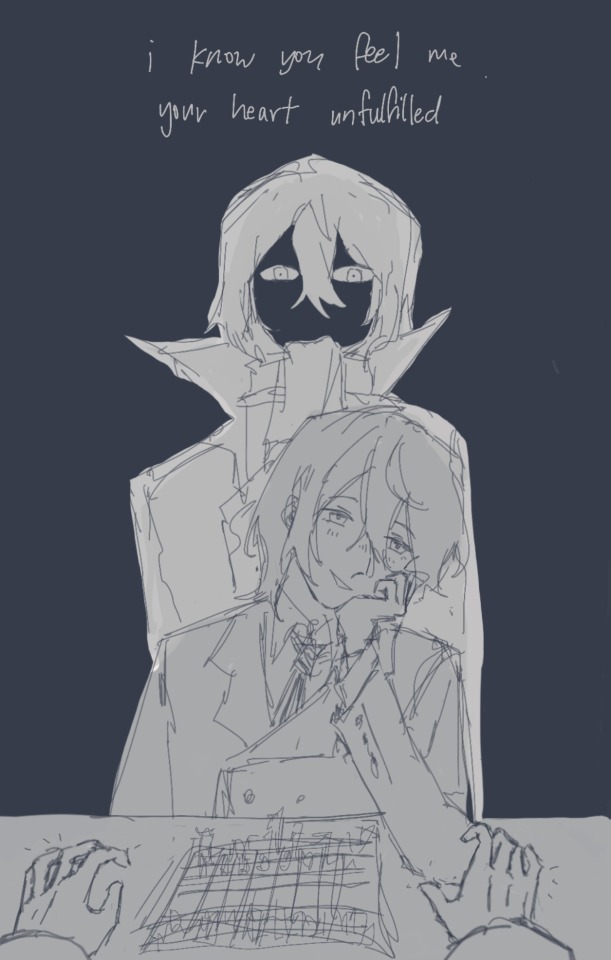
call out my name when you need me again
if you know who I am, why won’t you call my name?
#shaking u and telling u a soul w no king is an ideal reality song…#YES this is self indulgent and I would draw a whole lot more but I’m lazy!!! Somebody do it for me#p5r#akechi goro#ok… joker is implied#persona 5 protagonist#so… shuake is implied…#shuake#telling uuuuu it’s so ideal reality coded#”but if this is what you want why speak of right and wrong you still go in for the kill you speak of the devil like he’s not your friend”#R U SEEING IT#the joker trying to justify the ideal ending#trying to pretend#Yeah this if definitely not the meaning of the song but cmon. Cmon.#my art#doodle#doodles
649 notes
·
View notes
Note
https://youtu.be/op4Jza9c4UE?si=EhkyQo1goeZMwMIQ
I can respect your opinions on Snyder's movies, but he is right to view Batman and Superman as "toys" so to speak. Ultimately they are not real, and as such are subject to the whims of the author. It's the same idea as that Stan Lee quote about "whoever wins in a fight is whoever the writer wants to win". If Batman doesn't kill, WHY? If he does, WHY? What makes that decision so important, and if he breaks his rule what happens to him? I believe this video answers those questions well.
In regards to Superman, he kills Zod because Zod tells him he will raze the earth to dust if he lives. It is the only moral choice he can make; Zod himself says he is incapable of anything other than killing. "That is the sole purpose for which I was born". I think lamenting these characters darker or "edgier" experiences in the movies is missing the point: they are put through these trials to show that they come out the other side the same heroes that you love. The "character defining traits" are tested in fire and proven strong. The Superman that you and many others wanted to see would have been present in Man of Steel 2: the kind, optimistic, CONFIDENT Superman that knows who he is and has friends and family to back him up.
Or Superman can do what he does every other time Zod says he's going to destroy the Earth:
PUT HIM IN THE FUCKING PHANTOM ZONE
You're right that these are fictional characters. Which means the moral dilemma that Snyder put Superman in didn't need to happen. It happened because he wanted Superman to kill someone. Superman doesn't need to kill. We already have the best "What happens when Superman kills?" story. It's called Injustice and it's a nice little elseworlds tale that doesn't need to be retold. In that story, Superman kills The Joker after he nukes Metropolis and kill a pregnant Lois Lane. It's a split second decision made in anger, one that immediately traumatizes Superman. He's so traumatized that he starts desperately trying to justify the murder to escape his own guilt. He decides that the Joker was too dangerous to let live. He just nuked a city, for Christ's sake. Removing that kind of evil from the world is good, right? It's what they should be doing as heroes? Killing the Joker wasn't an act of revenge from a grieving husband, it was a superhero fulfilling his duty. But now that the Joker's gone, he's not the worst thing in the world anymore. And if that justification can work once, then it can work again. What follows is an endless series of actions and justifications that ends with Superman conquering the world and becoming a totalitarian dictator who kills on a whim. Because he is right, and anyone standing against him is stopping him from protecting the world, thus they're evil, thus he should kill them. This also leads to the best exchange that DC comics has ever published, which I'll post at the end under the cut since it's not really relevant to the discussion we're having.
The Injustice story shows what happens when Superman kills. It illustrates why these characters who have a no kill rule hold themselves to a higher standard. "With great power comes great responsibility" may be a Spider-Man quote, but it's also the basic philosophy behind superheroes as a whole. They have amazing power, and they have to choose to use it for good. More importantly, they have to choose not to use it for evil or for selfish gain. That way lies a greater evil than anything they stop on the streets.
And that's what Superheroes should be, in my view. They don't need to be dragged down into the mud with the rest of us. They need to be an example, an ideal, of what we hope the best of humanity is.
And Superman in Man of Steel didn't live up to that. He was weak, and in a moment of desperation and fear, he murdered Zod. Even worse, he suffered nothing from that. The narrative justified it. Clark felt no lasting guilt over it. No one ever even talked to him about it. That's not Superman. That's not Clark Kent. Clark Kent is the man who broke because he killed a psychopath who nuked a city and murdered his wife and unborn child. He's the man who was forever ruined by that act. He's the man who justified atrocity after atrocity just to escape from the all consuming guilt of taking one life the world is better off without.
As good as Man of Steel otherwise was, and I do still like 90% of it, that one scene and the aftermath shows that Zach Snyder is incapable of really understanding the characters he's writing. And yes, they're fictional characters, but they're not Zach Snyder's. He didn't create them, he didn't shepherd them through the decades, he didn't create or add to their lore and history with care and respect for what came before. He picked them up out of someone else's toybox, played with them, broke them, then moved on.
Anyway, I'll never pass up the opportunity to post these pages, so:
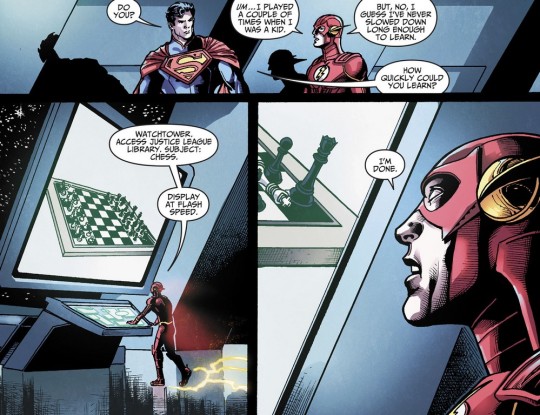
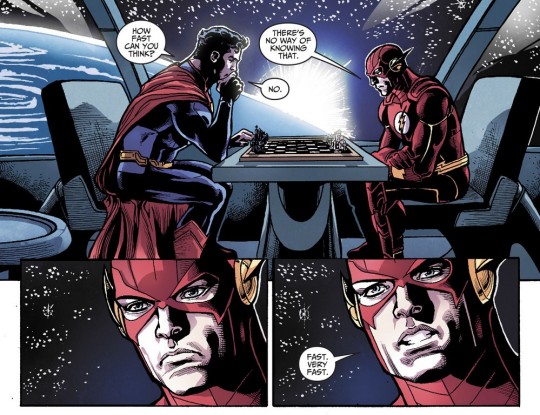
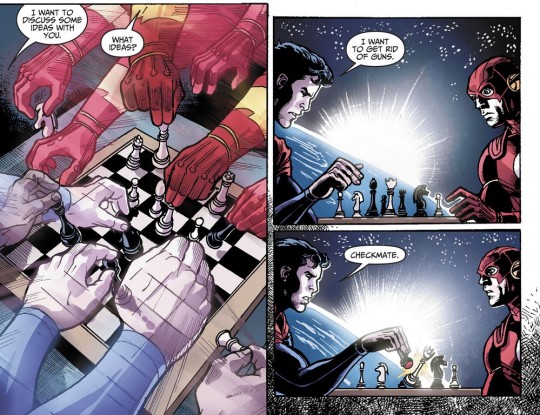
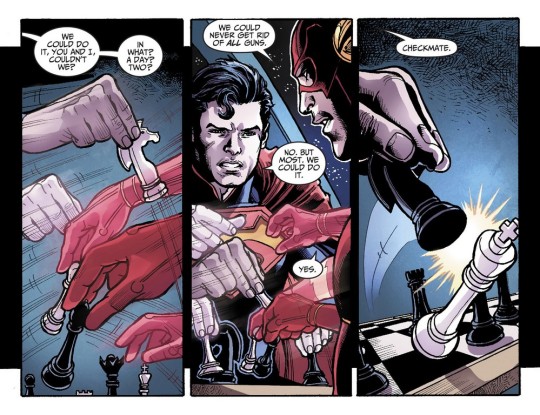
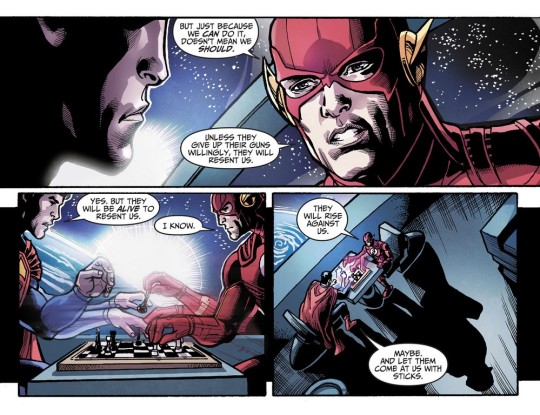
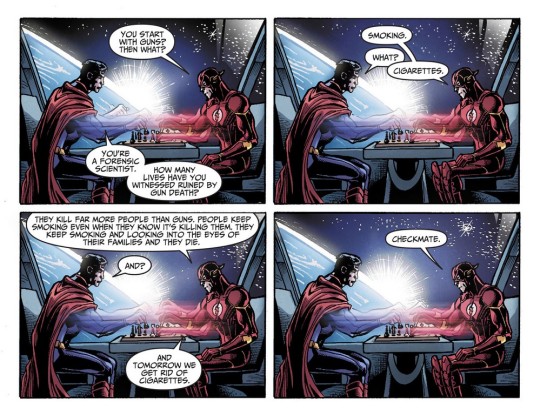
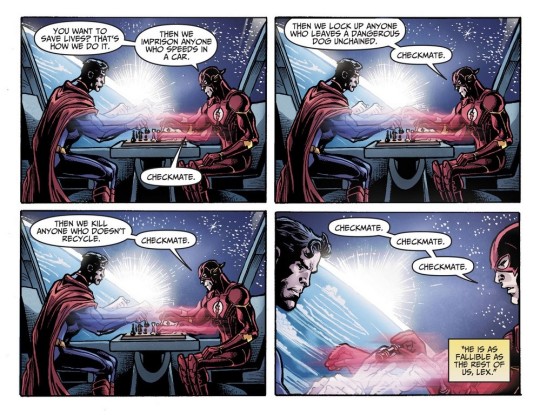
11 notes
·
View notes
Note
25 for the choose violence ask game :>
• common fandom complaint that you're sick of hearing?
ok iwill be doing comic for this one erm :heart_hands_emoji: i must admit i'm v tired of ppl talking crazy abt the bruce no kill rule like it's that unreasonable 😭 the entire point is he wants to inspire hope STUPICE. it's NOT just abt vengeance and anger and blahblahblah. it's about not allowing yourself to be judge jury and executioner it's about Wanting better and not considering yourself infallible like. god forbid a guy go hey i would like to deliver a justice where i don't kill people, inoccent or guilty as they may be, and then iwill try to help them after ☺️ and then ppl start trying to jump him fr saying that.
to use a specific common example like the joker...there's other heroes there's other ppl in gotham who could kill his ugly ass no sweat.....yr rlly expecting me to believe the jokester didn't kill smones kid and then that kids parent is a shithead cop or crooked lawyer who kill him before they cn even read him his rights..... don't even pmo me off. the reason the joker is still alive is SOLEY bcs of editorial and they don't wnna kill their dead horse yet even though he SUCKS AND NOBODY CARES 😭. don't get me wrong i ♡ comics but it's actually crazy an entire third comic company cn be founded w one of the ideals of "this shit cn get so stagnant smtimes we gotta let it end" only fr tht to STILL be an issue 30+ years later. in a perf world all of it would be a tighter narrative and the joker would be DEAD ALREADY but at least acknowledge the faults in that and where they come frm. IDK get mad at bruce fr sm shit thats justified like being a know it all and icing ppl out and being a paranoid freak. while still being a good guy :] does this make sense. my dark comic visions
#TY ROMEO IF THERE’S NOBODY ICN COUNT ON 🫶#askatraz#ask games#mummelthecryptid#discourse#<- ? i guess
1 note
·
View note
Text
(after a long rabbit hole through the #1 Alec from Worm fan's blog, I have an idea about Akechi Goro) (if ykyk)
So. In case, I have somehow not mentioned that this is for my personal University AU of Persona 5, this is for my specific retelling of Akechi.
Okay? Cool.
So the boy's been murdering people since 13-15, right? Why? Because narrative and revenge and he thought it was necessary. Not quite what I was asking.
Why does he think that the only reason he'll be useful to Shido was by becoming his personal weapon? Why does his mind go straight to murder? What was his childhood like?
Why does he crave that validation so much?
In my mind, the greater good of justice (read:revenge) is how he justifies the lack of autonomy he had. And yeah, no, he murders people, he fucks with their minds, in my AU, he's actually going to be worse.
Because where Rin (Joker) embodies horror as truth, Akechi's going to lean more towards Maruki with dreams and lies. His wild card ability works with the dream/Treasure room and fucking ruins it so badly that when you wake up, there's really nothing else to do but kill yourself.
This is what kills his mom. The thematic deliciousness of him not killing Futaba's mom but accidentally killing his gives me so much. The idea of just that creeping sense of something being wrong when his mom's personality starts shifting, when she starts being a living ghost, seeing that her ideal world doesn't even include him at all—killing her by trying to force his way into that world.
This is how he finds Shido. Shido who doesn't have his power but something better, something more—the power of influence and politics and lipservice. But he doesn't find him immediately.
First, he has to confront the guilt. He lies to himself about this. He has to. His mother killed himself because she knew that Shido would never come back because Akechi's existence was a mistake).
He gets sent to an orphanage. Thinks of what he'd say to Shido when Shido finally came for him. He won't be manipulated with gifts. He won't be so easily tricked like the children in his books, he won't be so easily bought. He is.
He's waiting for his father to come and save him, come get him. He knows that he probably heard word of this. Maybe he got these abilities from Shido. Maybe he can learn how to use it better than him.
Shido does not come for him. Months. Years. At 14-15, he leaves the orphanage one night and stumbles across one of the many entrances to the Metaverse. A mini-Ruler. Another death. This one ends up in the newspapers. One of Shido's political rivals, maybe not. Maybe it's the girl that Joker saved. Maybe it's not. Either way, this is where the mental fray between Akechi and Robin Hood starts to rear its head.
Two murders. After that, he kind of enters this fugue state for a few years where he both does and doesn't care about his survival and mostly just doesn't find much purpose in his own existence. Until he starts hearing the name Shido again. Over and over, positively. I really like the idea of Akechi not being a good person per se but after dealing with the Japanese perception of homeless people (which is straight up they don't exist/are lazy) and hearing the person who abandoned him is regarded positively... I personally believe the boy is allowed a little crashout. A bit of revenge planning and murder. Yes, Akechi is an assassin but he's also definitely finally getting some creature comforts and (fake) affection from being the Detective Prince. He actually does like investigating crime and cold cases which is what I imagine the segments of the show he actually gets control over being. Otherwise, he's stirring the pot and whipping up his adoring fans into a veritable frenzy using Shido and The Antisocial Force/Conspiracy's talk points. He's fully committed to doing whatever it takes to kill Shido and refuses to let him die a martyr so he collects as much evidence as he can against him, knowing that wherever Shido goes, where he's going will be much worse.
I imagine that Shido's "impulsive sex sprees" were often with foreigner women who didn't quite know the language and/or have social supports in their family or friends. As such Akechi's mom being French-African (maybe Ethiopian) strikes me as being another mirror for Rin's identity change. But I digress. Akechi's Dream ability being born from his desire to soothe getting twisted and misunderstood is deliciously angsty. Him also having to play into colorism for his show--his main trigger being dismissed or feeling looked over? Fantastic.

For his redesign, I tried to keep more of his original inspiration in just make him more grown-up but perpetually ageless and play up that bright Princely persona--dramatic, vibrant, soft, sparkling eyes--in direct contrast to his actual face. I gave him freckles and rougher skin and made more of that internal conflict in his eyes... Not that most people can see it. His eyes being dark and perpetually hungry hidden under warm, honey brown contacts is something else that I really am going to have fun writing into this reveal - redemption story and the enemies to lovers bit that I've got going. I'm super excited to write those Mementos missions. Crow or Kurou as the party's going to call him is defined by the black/dark knight archetype alongside that mesmer effect his suit has. The blue is Shadow blood.
1 note
·
View note
Text
"Why do you Takuto Maruki fans think he's a genuinely good person?!" (Invincible meme) "That's the neat part, we don't!"
Jokes aside, I do acknowledge that there is a non-zero number of Maruki fans who genuinely fall into the "Maruki did nothing wrong!" camp. I am not one of those, but I have theories.
I think some people are just blinded by how appealing the hypothetical of Maruki's reality is. Life is hard, so people sympathize with Maruki's escapism and try to logic out why it is justified for his reality to exist. They figure, "Who cares if a few kids get emotionally manipulated if it results in an entire world where people in wheelchairs can walk, people who lost their life savings aren't destitute, and corrupt government officials are actually held accountable for their actions? Plus- If Maruki can make it so that nobody remembers the terrible things he did to create this perfect reality, then those terrible things might as well have never happened. So all-in-all it was worth it, in the end." They are Cypher going "ignorance is bliss" and eating the steak, so to speak.
(This argument could also apply to extremely pragmatic people who agree with the philosophy that systematic change on a greater scale is more effective than the type of localized change the Phantom Thieves promote. People who are critical of P5's writing/themes overall.)
Other people may just relate to Maruki personally insofar as they have also experienced an inability to express extreme emotional pain. They try to justify Maruki's actions because they don't want to face the idea that doing a bad thing for the right reasons is still bad. Overall painting Maruki as 'just confused/misguided, NOT bad at all'.
Arguments I've heard from this camp include stuff like, "Maruki is just an extreme empath who was triggered.", "He only did that to Sumire because she asked for it.", "He wasn't intending to manipulate Sumire, he just did what made logical sense to him at the time.", "Akechi dying along with the false reality would have happened whether or not Maruki brought it up, he was just being honest and letting Joker know what was at stake", "Maruki puts Joker to sleep in the bad ending because he only intends to give people what they desire, and he couldn't figure out what Joker wanted so he compromised.", and "Maruki knew that in his ideal reality he could fix any problems that he caused; it was all for the greater good-- not just for the Phantom Thieves but for everyone."
(Funnily enough, I think these people sort of miss the point of Maruki? The reason Maruki quits being a doctor and becomes a taxi cab driver in the end is because even he realizes what he did was wrong. That's what stealing his treasure and having him go through a Change of Heart is supposed to represent, after all.)
So yeah, TL,DR: Maruki apologists usually think either A) his ends justified his means or B) a bad person is only bad if they intend to hurt someone and Maruki never intended to hurt anyone. That's my theory, anyway.
My opinion on Maruki, spoilers, obviously
So, finally got my hands on a copy of persona five royal like a month ago, finished it yesterday, because I work five days a week and have two days to play it. Amazing game, amazing characters.
But after going through the third semester...HOW DOES ANYONE THINK MARUKI IS A GENUINELY GOOD PERSON??? Like, I get the whole "he just wants to help people escape their pain" thing, but like...he himself admits before the third semester that it's not exactly the right way to go about things. There's also the way he goes about trying to prove his reality is better by...effectively retraumatising Sumire, someone he already screwed over mentally by making her think she was her dead sister Kasumi. Like, of course she's gonna react terribly to being shown the exact moment of her sisters death again, YOU STOPPED HER FROM ACTUALLY MOURNING IT AND HEALING FROM IT. There's also how unnerving everyone looks in his reality. Ignoring the main cast, I mean the general public, the people you walk past who fade out to keep the screen from getting cluttered, as you get closer to the deadline for Marukis palace they all end up with these horrific smiles I can only compare to the Puppets smile from fnaf, smiles that look like a threat display rather then any form of happiness. There's also the fact he dangles Akechis life in front of Joker and Akechi to try and get them to accept his reality by implying that destroying it will kill Akechi, GOOD PEOPLE DON'T THREATEN ANOTHER PERSONS LIFE TO WIN AN ARGUMENT, and if you fail to secure a path to the treasure he sticks Joker in a permanent coma for all of eternity to "spare him the pain of making a decision".
Maruki fans, please, I am dying to know how you all think he's a good person rather then just one with good intentions, because those two things are VERY different.
#persona 5#persona 5 royal#Takuto Maruki#I hope this explanation helps! :)#problematic faves can rub people the wrong way I get it#but I think having them is good if you're someone who likes to think critically about the things you like#...oh yeah and there's one more reason#Maruki is a very pretty man with a 'sexy' voice#And red flags just look like flags when you're wearing rose-colored glasses asdfgfl
19 notes
·
View notes
Text
episode 7 of Batman Beyond, "Shriek", is about the Wayne-Powers corporation attempting to tear down Gotham's historical district. this was such a striking episode to me since we already know the mythos of batman has always attempted to tackle the 'grittier' aspects of crime & justice. [read grittier as "grimly realistic"]. as a product of the late 90s-early 2000s it hold similar themes that many grunge comics and cyber punk/sci fi punk themes held about corruption, corporate greed, and the wealthy albeit in a general sense since it's still american comics, but it is doing something interesting here that i've always loved about gotham centric media.
Bruce is seen speaking with what i am assuming are the board of directors about the leadership's decision to expand into the historical district and fortunately it is successful. Bruce Wayne really cares for Gotham city, and many poor people across many other cities can relate to having their cherished neighbourhoods becoming slum-like landscapes only for property developers to do as they please once they are bought out. last month i was reading about gentrification (I forget from who) so the ideas are still a bit fresh and it was discussed how property developers will buy land and purposefully allow it to degrade in order to justify tearing down a neighbourhood and pushing out locals. this is of course to build cheaply made condos and other properties meant to line the pockets of the rich. i am already fairly well versed in the harm of gentrification, but it was interesting to the more malicious ways in property owners continue to harm the working class through things like housing and intentionally hostile infrastructure.
Bruce Wayne/batman is really special in that despite being from a rich background and having luxuries, he is one of the few people who still feel quite responsible for the state of inequality within the city. it shows through much of his actions as well as his psyche, he also doesn't even identify with being bruce wayne, but rather as "Batman" which is mentioned at the end of this episode. it is absolutely not new information to him about "crime" being directly to meeting the needs of the working class. i don't remember much from my first watch of Batman Beyond, mostly because I was quite young, but I am heavily appreciative of these explorations of IRL issues. I personally love when fiction is grounded in reality this way. Terry is somewhat beholden to the state of Gotham, he doesn't see the value in the historical district, but I wonder if his time with Bruce is helping him mature his ideas or if there's ever any tension between them seeing as Bruce had turned his back on city years ago and still maintains his wealth; or about the fact that it's Bruce's company that is directly responsible for the exploitation of the working class. i see bruce as not necessarily trying to push his ideals on others seeing as that never worked in the past (maybe he's too old to be so controlling...), but rather truly guide him in his missions. I'm sort of anticipating for any moment Bruce talks about past robins since I remember Return of the Joker the most out of the whole series 😅
we also see other things happen in the episode, Shriek having been rescued from bankruptcy by Powers and becoming a criminal so that he continue research. at the heart of Batman media we know the biggest criminal is the rich and the police/politicians that maintain their material interests. while watching this episode it is just so clear that Powers is responsible creating criminals and that he is able to pay/coerce these villains into doing what he needs to in order to consolidate power. (thinking about the first 2 episodes where we see Wayne-Powers corp as integrated into a fictional military industrial complex). when Shriek chases after Terry and get's spotted by the cop hover-crafters, he is next seen in Powers' office talking about how he can't show his face and can't use his name and can't return to his lab. how he is being forced to face the consequences of his actions. Powers tells him that being feared is better than being loved and convinces him that having power as a criminal is worth it. in the end Shriek is the only one that suffers for his actions while powers is able to walk away.
maybe this is just the lens that I'm watching this through, but it is so clear that this is pointing to the Powers being representative of systemic issues seeing as he is CEO to such a wealthy company and the villains that he uses every episode are complicit middle men. i also really appreciate that Batman Beyond actually explores bruce's trauma. the historical district is one of the only areas that doesn't have neo-Gotham's futuristic infrastructure, in fact, it contains the movie theatre in where his parent were murdered. i mentioned this earlier, but it was noted that Bruce knew that he was not experiencing psychosis because the voice that was attempting to manipulate him called him by his name as opposed to "Batman" I wish DC would allow Bruce to age and reflect more, especially with respect to his ideology and identity (but that would also require the writers to understand marxism and anti-capitalism lol). the mythos of Batman is so interesting and so many recent iterations of him do such a bad job? there's both an attempt at working through the logistics of him as a figure as well as a removal from the understanding of class politics unless it's for a one liner joke.
I am glad that the Bruce of the future is revitalizing hope for the future of his city and that he is able to share this knowledge and experiences with Terry. there is so much value in "organizational memory" and although Terry is not very smart, he is absolutely a great fit for bruce's cranky pessimistic nature while still being able to interact with these themes.
4 notes
·
View notes
Text
Persona 5/Persona 5 Strikers: Pro-Police or Anti-Police?
Hoo boy... So this honestly has been a LONG time coming on my end because I have seen so much of that debate on social media (Twitter namely) and I can see the points of BOTH sides but there have been moments where it just got out of hand... Especially whenever people tried to put in a more grey/nuanced take only to be slammed and taken out of context. Even repeatedly mentioning the interrogation at the beginning of P5 which, I will admit has gotten tiresome. At least for me, I do still feel for Joker and I wished the game acknowledged his trauma more but there's a thing called, "beating a dead horse" and this is one along with "Haru says ACAB" in Strikers (which was done THREE TIMES in the same arc and it got annoying fast, like shut up already! We get it!). So, let's dive in a little bit:
MAJOR SPOILERS UNDER THE CUT!!!
Persona 5/Persona 5 Royal
Now let me just say I know! Police in Japan are just as bad if not worse than the West and I STILL hate the idea of Makoto wanting to become a cop for such naive reasons (especially with what happened to Sae, her own sister!)... But there are at least some of form of nuances sometimes and by that I mean, I can see what they were trying to do? I do agree that P5/P5S backpedaled SEVERELY by deciding to sweep issues under the rug after addressing them and not continuing from such. In fact I feel like it could have been a hell of a lot better. But P5 did something different compared to previous games and addresses the issues DIRECTLY right at the beginning of said game! It was tense and horrifying, but needed. Of course... They then sweep it under the rug and act like nothing traumatic happened to our protag which is NOT a good look at all and I'm still pissed off about it. In the main game's case, it's portrayed as more black and white with only a SMALL amount of nuance like that cop that was trying to help Futaba when she went out by herself and got lost (which people ignore entirely by the way). So I CAN see where people got the "anti-police" message from... But that's only the tip of the iceberg as it's ACTUALLY more about Systematic Corruption, not exactly or JUST police corruption. Namely in politics with Shido and the Conspiracy (which is apparently still somewhat around in Strikers until Owada's downfall) controlling everything all the way to law enforcement. The force had been basically under his payroll (including the corrupt SIU Director before his death) whether by force or not (mostly not in this case though). Now honestly, the police depicted there are undoubtedly rotten to the core save for a VERY SMALL handful (the cop that was trying to help Futaba which, again, gets ignored by several). Look at the interrogators who ruthlessly beat and drug a minor without any second thought or remorse for example. But again, the black and white narrative the game kept unwittingly doing ended up being to its detriment in a way. I'm not defending those assholes AT ALL! They deserved every punishment given to them! But for a game that goes on about grey morality... It doesn't quite deliver on that. Still though, it does emphasize that it's more of the fault of the whole corrupt system, not just one part of it. There needs to be change and reform which is what our MCs were trying to do in a way (more like inspiring change but still). In the end, it's all about the following:
Corruption and abuse of power.
Again the police depicted in this game were incompetent at best, corrupt at worse with very few silver linings. But it's not just them but rather the one person responsible for the whole mess. Who had them under his payroll? Who controlled them and by extension all of Tokyo? Who was willing to dispose of anyone who "outlives their usefulness" or is perceived as a threat to what he wants (including his own family)?
SHIDO AND BY EXTENSION THE CONSPIRACY
Bottom line: They are definitely a problem but it's not just them.
"But, Joker and his trauma?"
I definitely understand that and still do. I fully believe he has and still has trauma with the police. Easy! But... I do feel like people go too far with it sometimes. It's hard to explain but there have been moments where people either use it as a justification/argument against someone trying to provide a more nuanced view of things or... Dare I say, depict him like a "uwu soft traumatized boi." Like I said, it's hard to explain on my end so feel free to ignore it. Everyone deals with trauma differently so there is STRONG chance that I'm overanalyzing it. I just remember moments where I just feel a little, I guess annoyed? I'm not sure exactly but final thing: I understand what he went through and I can't imagine how long it would take to recover but I hope he DOES overcome it.
"Sae? Akechi?"
Yep, even though their jobs are different, they are by and large members of law enforcement no matter how you spin it. Both were broken in a way. Akechi is pretty easy to explain with how Shido negatively impacted his life but not much about Sae, who dealt with sexism/misogyny at her workplace along with the trauma of her father's (also a cop) death. She no doubt had some idealism only to be hit with the fact that she's gonna have to use underhanded/downright illegal tactics to get by and even rise up the ranks. She, therefore ended up (well, nearly) corrupted herself before coming to her senses. That's honestly one of the BIGGEST REASONS why I felt like Makoto joining the force to become a police commissioner isn't a good, even a downright naïve, idea. I honestly would have been somewhat fine with it if it weren't for that fact among other things. Regardless of her willpower, it will go south fast.
Now... Onto Strikers!
Persona 5 Strikers
Since the game came out and I started playing it, I still feel like the system is still beyond saving, especially when attempting to do it from the inside. But I don't mind the added nuances that P5 didn't do much of. It's still continuing the critiques, just shows more of what does happen within said system and even has an ACTUAL officer (Zenkichi) say, "Yeah, my job sucks, everyone's corrupt, there are much better ways to do things and make a change but not this. I'm only staying because I have a daughter to take care of and it's all I know. I'm no different from them." Was it all handled well? I wouldn't say "yes" (Joker's trauma is BARELY addressed at all of course) but a little better than what P5's narrative did which only addressed the issues but not exactly follow up on them. Now to be fair... In the system, regardless of where you live, any one within it who remotely tries to do something or speak against it either lose their jobs or even go "missing" irl. Those have happened and it's more proof that yeah, it's rotten to the core. There's no denying it but regardless, that's NOT what the game is about at all. At least that's what I feel about it as it's only PART of the narrative. I think Zenkichi puts it best here:


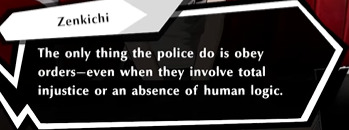

Speaking of Zenkichi... Oh boy... Now I definitely understand some of the criticisms with him but honestly, he was the best written (PT) character I've ever encountered! He was honestly the perfect representation of those that genuinely want to help and do good, only to be held back by an extremely harsh reality. It was already hinted at with Sae but here? It 100 percent confirms just how harsh and even cutthroat it can be if it could break someone's idealism so badly. Even Kaburagi of all people thinks the same thing Zenkichi said:

Then there's his past and it's a tragic one! But let's look more at the decisions he ended up making:
While it was no doubt done to protect his daughter, he ended making a selfish decision along with a selfless one (which was brilliant!) with not only allowing the cover up of his wife's death and denying justice for her, but also ruining an innocent person and their family's lives.
It's horrible, but also... There's a grey area/nuance as with the rest of his character. It was both understandable, but also wrong as he, as Akane's Shadow puts it:

He sacrificed his values, his morals, all for the sake of having a peace of mind. Speaking of Akane, she's also an interesting case in a way that she more or less perfectly represents the more "black and white" views on justice in general. Namely the more toxic/biased kind. Her reasons are also understandable but she was also acting selfishly by only focusing on how SHE was effected by Aoi's death and not even considering those that were also grieving her death and/or that people grieve/handle grief differently than her. But back on topic.
Her own views and beliefs that law enforcement basically SHOULD be dismantled (mostly out of said childish bias and black & white views) and it's framed as WRONG and it's very much correct on that. Chaos and order are two sides of the same coin, one can't exist without the other. When I say ACAB, I'm calling for reform, defund, have the corrupt held accountable for EVERYTHING and even face jail time for their crimes! Defund the police, have the ones that arrest, harm, and even murder out of bias (race, gender, etc.), lose their badges/jobs and locked up, make improvements! It's saying that there IS still corruption out there and there's no denying it. But fully eliminating the law in general will just lead to more problems. Now granted, she's young and clearly doesn't fully understand why those views are ultimately wrong but still... It was a very interesting subject to tackle and I feel like they handled it well.
Now back to Zenkichi, he was at first in denial about his decisions ultimately being the wrong ones too and even tries to justify it. Of course, his Shadow said otherwise and that was when he finally admitted that he really did act no different from the criminals he despised. But it also doesn't mean he can't redeem himself and that's what ultimately leads to his new resolve:




That right there along with everything else! There's the nuance! And ultimately despite some hiccups, Strikers handled the grey morality and nuance beautifully! Especially regarding law enforcement! Dare I say, even better than the base game! It continues the critiques with no problem but also showing different sides and areas of it! There is good and evil, but what about in-between? What about the more greyer area? It still says that there IS corruption, sometimes even beyond saving but... Sometimes a small silver lining is hidden somewhere.
Now, the ultimate question:
Is P5 & P5S (namely the latter) Pro-Police or Anti-Police?
Personally, my answer is this: Neither.
Why? What theme do they both have in common?
JUSTICE
Someone puts it best on Twitter that the games are more pro-justice and I fully agree!
P5/P5S gives the idea about following your OWN justice, your OWN moral code and rules, paving your OWN path and not let others dictate it! That's what the MCs ultimately start to learn in both games. Therefore it's pro-justice. Again, do I agree that the system is beyond saving? Yeah. Do I at least acknowledge and understand what the narratives are trying to say and nuances regardless even if I don't agree with some writing decisions (ex: Makoto wanting to become a commissioner despite everything)? Also yes. But at the same time, don't judge a book by its cover for other people (not just law enforcement and politics mind you). Especially some that genuinely DO want to help at best. That there is nuance and greyness, just have to look closely. Some of the MCs are still TERRIBLY written and executed (even annoying) but the message was still somewhat there.
Final Thoughts
Now I fully understand how you all feel of course! I still believe in ACAB and even I agree that maybe I'm one to talk and have a lot more to learn about the world... This is just my own attempt at putting my own two cents in. If you disagree, that's fine! This is just what I've felt should be at least talked about more often. And I tried to phrase it as best as I can without coming off as insensitive or ignorant and if I did, I sincerely apologize for that! I'm not trying to say, come off as a "bootlicker" or any of the sort. I'm just trying show discuss more of the grey areas and nuances that are, more often than not, constantly overlooked. How one interprets both games is ultimately up to them. You, the player. And this is my own interpretation. Simple as that. I hope you all have a good day/afternoon/evening!
#starchild rambles#analysis#persona 5#persona 5 royal#persona 5 strikers#p5#p5r#p5s#p5s spoilers#p5r spoilers#p5 spoilers#long post
32 notes
·
View notes
Note
i'm interested in hearing your thoughts on garrus being shoe-horned into the best friend role if you want to talk about it!
I may not be able to talk about it as much as some people who are super Garrus-critical, but yes I can try!
this really becomes a problem in ME3 more than the other games. basically my understanding of Garrus’s writing in ME3 is that they were well aware that of the fact that he was a fan-favorite, and didn’t want to threaten that, so they made it his crux. they took most of the fandom’s feelings for Garrus and decided to reflect that in Shepard’s relationship with Garrus, but by doing this, they basically ended up pretending a relationship had been there throughout ME1-2 that existed in some player’s heads. of course, Mass Effect is an RPG (well, sort of) so in theory... your best friend could be whoever you want to be, so with that in mind, it’s a little strange for a dev team to go “your best friend is this one character and we will write all of his scenes around that assumption.” unless they really want to play up the fanservice, I guess.
when he’s introduced in ME1, people joke about how they would never not recruit him, but it is a possibility—you could run through the entire game having only met Garrus in the Citadel Tower and never spoken to him again—in which case by meeting him again in ME2, it is a little strange to see that guy you barely remember from the Citadel in the last game show up, but not entirely unwelcome, because at least you, like, recognize him. it’s a little odd how you banter like old friends by making fun of his scars, but what is straight-up bizarre is how in the next game, ME3, Garrus talks about how he was there with you fighting Reapers from the beginning. of course, not a lot of people would specifically go out of their way to avoid recruiting Garrus in ME1, and very few people probably naturally avoided him standing by the elevator in ME1 (which is the only way to not recruit him if you don’t find him in Dr. Michele’s clinic), so the odds of someone not recruiting him in ME1 are low unless they intended to, but it’s still possible.
come ME2, I think they chose to forget that. a few lines have changed in 2 if you don’t recruit him in 1, but not many. remember in ME1, Garrus was an optional squaddie, who had an optional side quest, and his relationship with Shepard there was very much superior/subordinate, or as some people interpret it, more mentor-like. the most personal they get is when they talk about their jobs, the difficulties they face making moral choices, a bit about their families, and Spectrehood. it’s a nice introduction to Garrus’s character but the lines are drawn pretty clear between their roles; by the end of ME1, given the canon dialogue, the closest I’m personally willing to believe of their relationship from helping him deal with Saleon is “subordinate I am fond of,” or post-Saren after Garrus leaves the Normandy, “ally I can call on later.”
and then Shepard dies and is gone for two years. by ME2, when you meet up with him again, I actually find this jump from “subordinate” to “ally/friend” works for my Shepard, but it might not for people who never really engaged with Garrus or even liked him on the SR-1, or those who weren’t thrilled with the idea of him... basically running off to kill as many people as he could on Omega after Shepard got themselves spaced. if you don’t romance him in ME2, he has so little content in ME2: his recruitment mission, post-recruitment convo, loyalty convo trigger, loyalty quest, and post-loyalty convo. if you romance him, you get several more scenes, but compared to other romanceable companions like Miranda or Jack—whose attitudes toward you change the more you talk to them—or even Samara, who you can just chat with while looking out at the stars, Garrus’s platonic relationship with Shepard seems to stall after the Sidonis quest: you gain his loyalty for the suicide mission and then you’re assumed to be all cool. realistically, they could’ve given us a lot of reasons why Garrus might not want to talk—he’s probably still reeling from getting his face blown off and confronting his betrayer again, or if you don’t let him kill Sidonis, maybe he could’ve gotten pissed at Shepard and confronted them—but that’s me trying to justify a lack of content. truthfully there’s very little non-romanceable Garrus content in ME2 to build up that “best friends” angle they want to sell in ME3.
in ME3, you DO get more content that shows how naturally “at ease” he feels working with Shepard: his recruitment mission, longer conversation trees when he joins, more banter from squaddies—including Garrus—on missions, him inviting you to go bottle-shooting, a scene with him after every main mission where he asks you how you’re doing, if you miss Ash/Kaidan, mutual struggles over the burden of leadership, worrying over his family, etc. by this point though, if you didn’t romance him, he’s treating you like his best friend even though he basically ignored you all of ME2. again, you could rationalize that time as his social awkwardness on a Cerberus ship, or him dealing with trauma, but in my friend’s words, it’s really more of bioware telling-but-not-showing that they really wanted you to like this guy but waiting until the last game to give him consistent scenes with the player that reflected that closeness.
on paper, Garrus makes a lot of sense to be close to Shepard, because assuming you recruit him in ME1, he’s been fighting Reapers with Shepard in every game, but also... so has Joker or Chakwas or Tali, for the same reason; so does Ash or Kaidan, for being the only Alliance teammate who was there at the beginning and end (assuming they didn’t both die); so does Liara, for being there every game and only abstaining in ME2 because she was still dealing with the fallout of saving your life (there’s lots of criticism of her being “forced” on the player too and while I agree with some of it, that’s a topic for another time lol). Bioware does introduce Garrus early in each game—I don’t know if this was intentional, because they knew he was so popular so they wanted to give him to the player early—but then he has so little to say in ME2, the game about building relationships, that introducing him early just means he stands around for half game talking about calibrations. a lot of fandom, especially shakarian fans, end up filling the gaps of ME2 with their own headcanons, myself included, to make the relationship development feel a little smoother, but the trouble there is when we start treating it like it was always canon for everybody.
I know it seems weird to complain that such a popular character should’ve had even more content—there are lots of other characters just as or more deserving who got really screwed over (coughs Ashley)—but in my ideal world, they all would’ve had more content lmfao.
45 notes
·
View notes
Text
Twice: Death of a Good Man
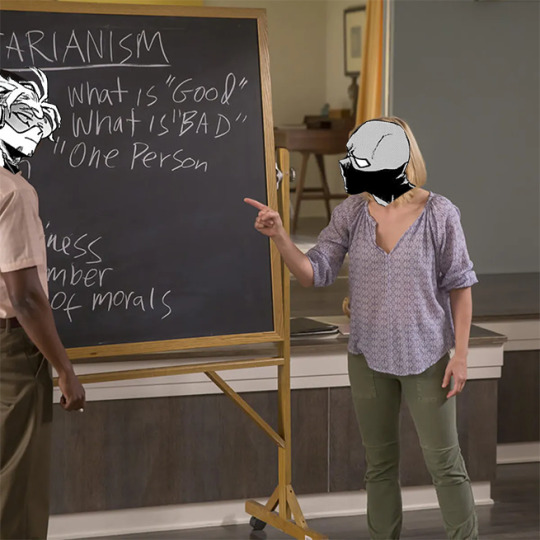
What is good? What is bad? What is the worth of one life?
That’s the question asked by the decision that Hawks makes to target twice. This post will look at the moral philosophies that overlap with those deicisions. @waxwingedhawks made a similiar post which you should check out, and while we might overlap I’ll be discussing different material. However the gist of this post is, even if Hawks decision was to prevent the deaths of thousands then is it worth it to kill a good man like Twice?
1. Should the Batman Kill Joker?
Slides taken from this powerpoint: [Source.]
There’s one famous example of ethics in hero comics that relates to this very issue of Hawks killing Twice. It’s especially relevant because Twice himself is a character based off the Joker, in that his whole life was changed by one bad day.
The ethical question is should batman kill the joker to put a permanent end to his crimes, and save the lives of everyone the Joker was going to kill in the future.
The quesetion itself demonstrates the conflict of Utiliarianism vs Deontology (or Kantian) when it comes to moral ethics. Utiliatiarnaism and Deontology are two opposing branches of ethics. And (this is simplifying here) the conflict between them arises from differing answers to this question? What is it that determines whether something is right or wrong.
Utiliarians believe that the results of an action are what determined if sometyhing is ethical or not. Therefore, this branch is called consequentialism because it states that the consequences of our actions define our actions. In other words the ends can be justified from the means.
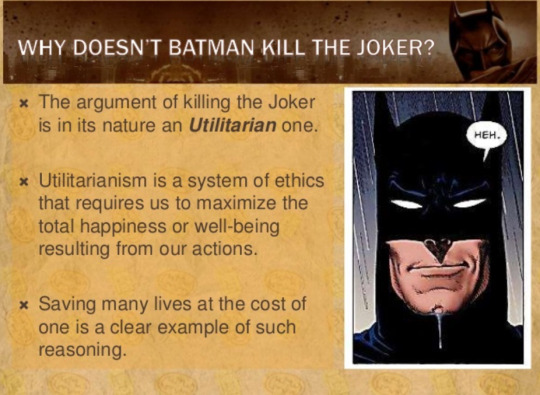
Deontologists believe that the means themselves are the ends. Batman’s no killing rule is a deontological one. Deontologist believe that morals are not determined by the results of our actions, but rather there are set rules outside of our actions that we choose to follow or ignore. A deontologist would say that nothing good can be achieved from unjust means.
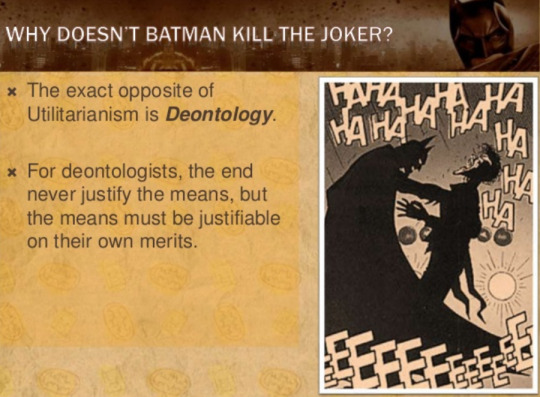
Batman believes killing is wrong, so he won’t kill the joker. The utilitarian argument is an appealing one. Batman could save so many lives if he just chose to bend his rule once. However, the appeal of utilitarianism is its flaw.
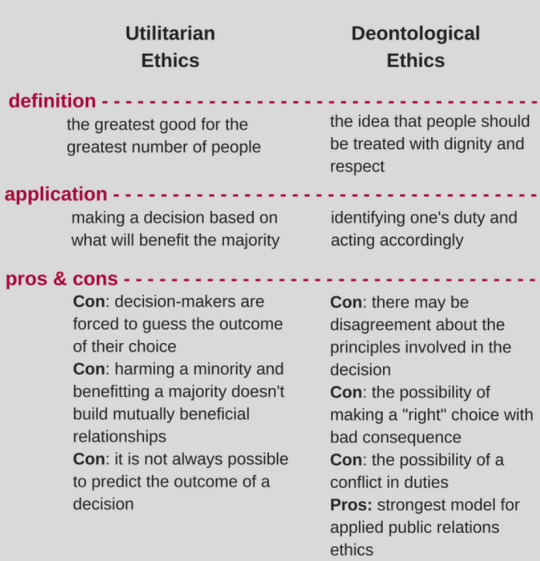
Utilitarianism summed up, is the greatest good for the greatest number of people. However, it pre-supposes that there is an objective greater good that the decision maker is working towards. Humans are fundamentally incapable of being objectives, and there’s no agreed upon objective “Greater Good”, its an idea that varies from person to person.
The problem with “the greater good” is that a lot can be seemingly justified towards it.
The reason batman doesn’t kill the joker, is the same reason crimminals are afforded civil liberties. It’s a deontological one. The idea that people always exist with certain rights, and should always be treated humanely is done for the sake of everybody. It’s not to let crimminals get away with crimes but rather to prevent innocent people from being wrongly persecuted.
For example you can use utilitarianism to justify putting cameras in people’s homes. If people never do anything wrong then there’s nothing to hide, right? Only the guilty will be punished. However, the reason we see this as a bad thing is because the definition of something wrong can change easily. If you put a camera in someone’s house, suddenly speaking badly about the government can be defined as something wrong, and you can be arrested for it.
As stated in the chart above, Utilitarianism is something that can quickly slide into harming a minority for the benefit of the majority.
To take another example from pop culture, there’s the famous scene in star trek 2 where Spock, a person who tries to live mainly by logical ideals rather than emotional one gives this famous quote.
Spock says, “Logic clearly dictates that the needs of the many outweigh the needs of the few.” Captain Kirk answers, “Or the one.”
However, while Star Trek is the source of this quote they also stated the exact opposite idea in the third movie, where every single characters comes together and puts themselves at risk to revive Spock. When Spock comes back to life, Kirk says the reverse.
“The needs of the one, outweigh the needs of the many.”
The third movie states while it may be true that one person’s life is worth sacrificing to help many people, the other is true as well. That many people can come together and risk their lives for the sake of saving one good man. The point being that the world doesn’t exist in strict utilitarian, or Detonological ideals, but rather we’re always working for a spectrum of both. People should make sacrifices for the greater good, and people should respect the individual needs of the minority are two ideas that only contradict each other in a world of black and white, in a world of heroes and villains.
2. Harming the Minority
So, once again returning to the ethical question set up by the Twice and Hawks conflict. Is saving perhaps thousands of people worth killing one good man?
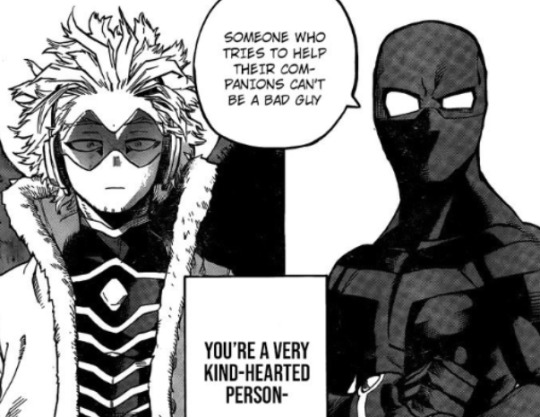
While Hawks is contemplating this question, the story gives us a very deontological rule. Someone who tries to help their companions can’t be a bad guy. Simply put, the act of helping other people is good, whether it comes from a hero, or a villain. In fact we’ve been shown this in the story before, Shigaraki is a murderer who lashes out at random, and he’s also a person who provided a home to several unstable people and helped them improve their lives, both of these ideas while contradictory exist at the same time.
Hawks and Twice’s beliefs contradict each other on a sociopolitical level. That is, both Hawks and Twice have a different idea on how society should be run. Hawks’ ideas are primarily collectivist, and Twice’s are individualist.

Hawks’ ideas are centered around two things, maximizing effiency, and the greater good. His goal has always been to save as many people as possible and to maximize the efficiency of his actions while doing so.

Hawks will always sacrifice the few for the sake of the many. What he believes, and what he was also specifically raised to believe is that he should be capable of saving everybody. That Hawks should devote all of himself to the sake of the people around him. The ideal of a hero, but not really a person. Hawks believes that whether people are saved or not lies entirely on him, and therefore he always maximizes the number of people he can save with every action.

Even sacrificing parts of himself with those decisions. When Hawks knows that he is not strong enough to kill the High End Noumu, intsead he sacrifices his wings (which are Hawks’ symbol of personal freedom) in order to give Endeavor the strength boost to defeat the villain. Hawks has to sacrifice himself. He always has to sacrifice himself for the many.

Which is why Hawks flies so fast. He genuinely believes (or rather was taught to believe) that if he works hard enough, if he sacrifices himself and is the perfect hero then he should be able to save the people he wants to save.

This is what makes Hawks the man who moves too fast. The reason other people can’t keep up with him is because they don’t devote absolutely all of themselves, to the point where they have no lives outside of their own work to the act of saving others.
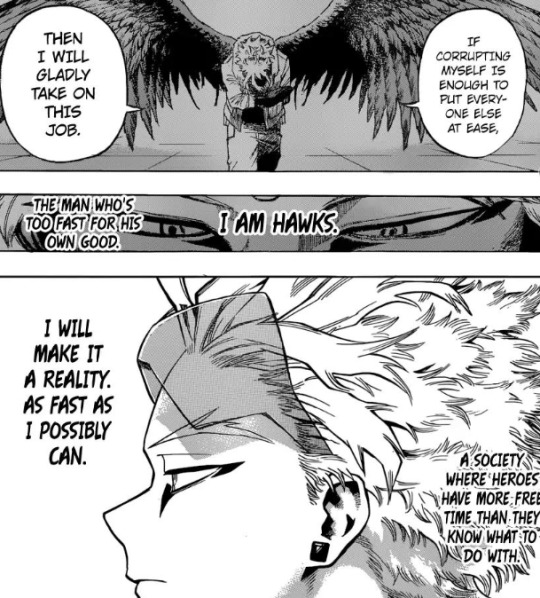
Hawks will always choose the selfless choice. Even the decision to kill is a selfless choice. You could argue that Batman not wanting to infringe upon his personal morals to kill Joker even though Joker might kill other people in the future is a selfish choice to make. Hawks would murder Joker in about ten seconds.
Hawks is a collectivst to the core. His argument is that personal feelings and invidual freedoms should be stomped all over if it’s something that benefits the whole of society.
The ideas of Twice and the liberation front as a whole are individualit ones. Basically, individual liberties should not be stepped all over for the process of the greater good.


The League of Villains and the Meta Liberation front are both a response to hero society’s tendency to let the minority suffer for the favor of the majority. I’ve spoken about this point before, but in the abstract the liberation front has broad, agreeable ideas.
Hero society is conformist in nature. People are often bullied because they do not fit the right kind of quirk.

In a society where literally everyone can shoot lasers out of their eyes, bullying people, intimidating them, pressuring them to conform is not necessarily the right answer. Collectivism works on the idea of there being an in-group and out-group. Obviously, for an in-group to even exist people have to be excluded.
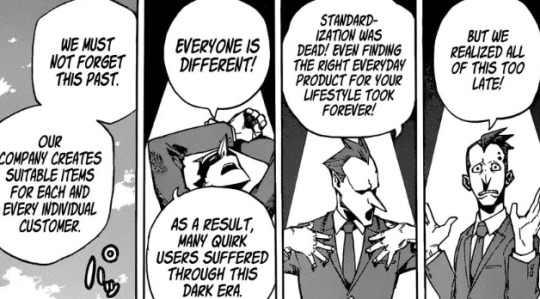
It would make more sense to run hero society from the angle of people have thousands of different types of quirks, we should do out best to maximize the inclusivity of society so that no one gets left out. The fact that people sympathize with the liberation army is because the current hero society, rather than trying to be accomodating to the differences between people and protecting the minority, instead chooses to oppress the minority and let people who could have been helped become villains because it’s just easier.
Which is what Twice’s backstory is entirely about. That even trying with your best intentions to turn your life around, you can fall out of society through no fault of your own.
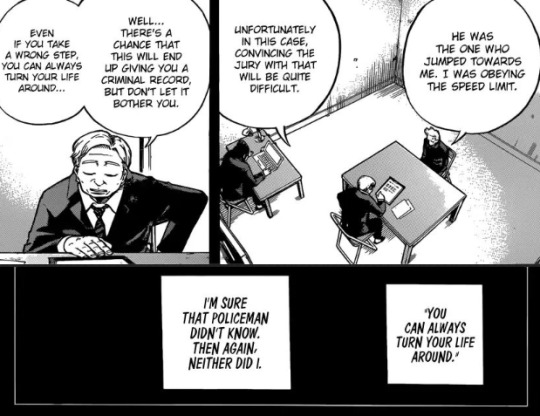
The idea that Twice became a villain not because he’s a good or bad person, but instead because of good or bad luck. Something that Twice really doesn’t have control over.
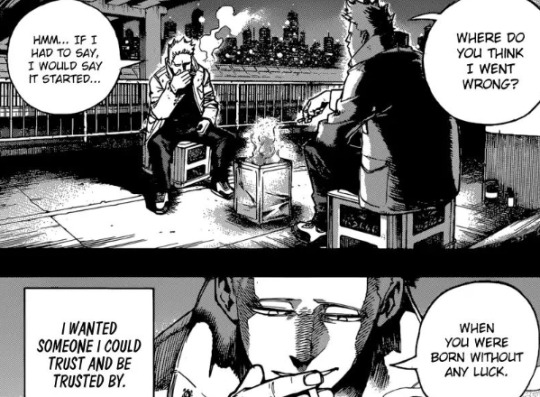
So, the LoV and MLA are an individualist response to an oppressively collectivist society as a whole. Those who cannot conform, want to destroy the current society that excludes them.
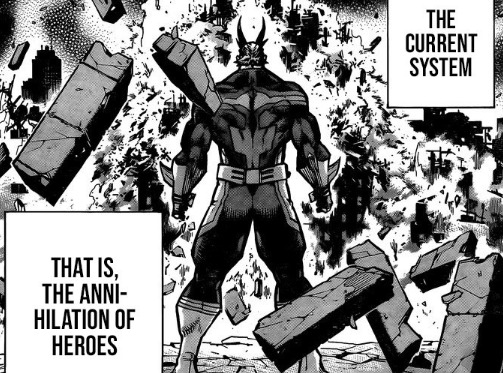
However, Twice values people’s feelings over the greater good of the mission, whereas Hawks will stomp all over his own feelings for the greater good of his mission the twist is that both of them are utiliatarians. Both Twice, and Hawks will justify murder in order to bring their ideal society in place. Twice’s philosophy sounds well and good that people who are outcasts should be taken care of, until you remember that Twice regularly wants to murder people in the name of protecting his small found family.
Twice still believes in a very unhealthy way that he needs to pay everybody back in the League of Villains for accepting him, by being useful to them. Even though the league cares about Twice’s feelings more than his use as a person, Twice still really sees himself the way that Hawks does. The only worth Twice has is a person is how useful he is to other. It’s just both of them justify their utilitarianism through different social viewpoints, Twice kills to protect the few, Hawks kills to protect the many.

3. The Death of a Good Man

Twice has stated these ideas before in the manga. First that he would never kill a friend, and second as what he told Hawks above a person who helps their friends can never be a bad guy. By Twice’s logic alone, Hawks betraying his friend makes him a bad person even if he is betraying that friend for good reasons.
For the final part of this meta I’m going to talk about the flaws of Utilitariansm. I’m going to use an example from another manga, Bungo Stray Dogs with the character Ango Sakaguchi.
In the second light novel we’re told the story of the Dark Era. To summarize, there are three people who work for the mafia, Dazai, Ango, and Oda. The three of them are drinking buddies, and sort-of-friends who meet outside of work and discuss. Eventually their work, or rather the system causes their friendship to fall into conflict.
Of these three people we have: Oda, a handy man for the mafia taking care of orphans who has a person rule to never kill people directly, because he believes it’s an absolute wrong to kill someone. Ango, a spy who incredibly similiar to Hawks will lie, manipulate, and deceive his own friends for the sake of what he always calls the greater good.
Dazai, a mafia executive who kills people and joined the mafia because he was suicidal and wanted to find a reason for himself to live.
Dazai and Ango exist on opposite sides of the political ideas spectrum, Dazai is an inidvidualist who only really thinks of himself, Ango thinks of the good of everybody as a collectivist at the cost of his individual relationships with his closest friend.
Oda is somewhere in the middle between them, however he’s acknowledged as a good person. The twist is Oda used to be an assassin that killed many people for whatever reason in the past. Just like Twice, he’s a dangerous crimminal. However, at the same time he was reforming himself, trying to be to a better person, and taking care of several orphans without a home. He had also stopped killing people at this point.
The story sacrifices one individual good man, in order to achieve what is called a “greater good” for everybody else.
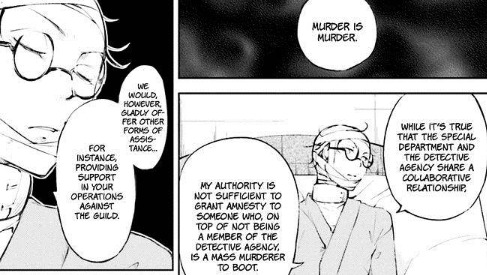
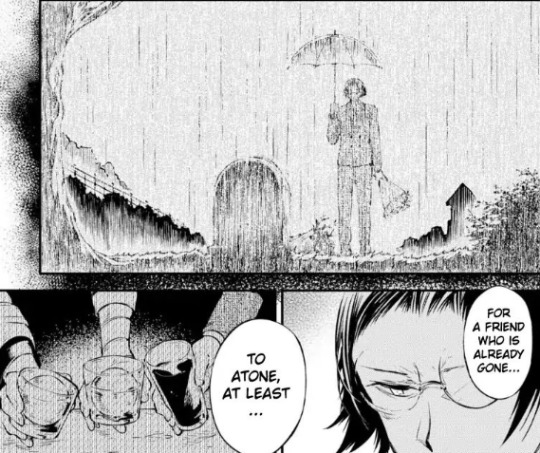
Ango is an individual with a strict and unbreakable moral code, always acting for the good of the majority. In a simple black and white story, he would be seen as a good person. However, not only did his actions result in the death of a good person, or at least a person trying to be good, all of the orphans Oda was trying to take care of died as well. That is a powerless minority was considered an acceptable sacrifice in order to maintain the status quo for a majority of people.
We see Ango make these choices again and again. To betray individual people for the sake of a faceless majority.

In the most recent chapter of the manga, he almost decided to shoot Atsushi in the head in order to make a quick decision to save as many people as possible. He even pretty much convinced himself that his only choice left was to murder Atsushi. Atsushi of course being… another powerless orphan with very little agency within society as a whole.
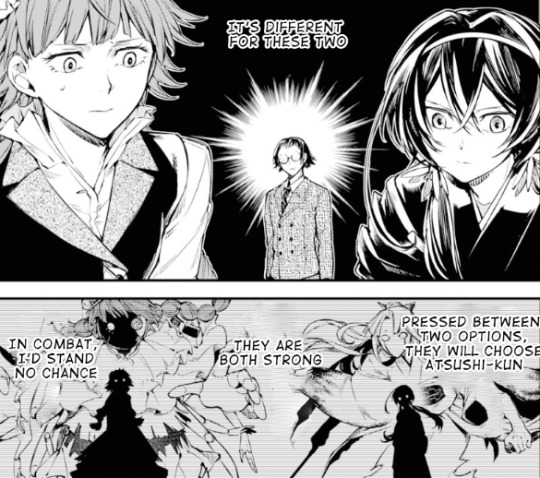
Ango would sacrifice Atsushi, someone who trusts him and is working with him if he thought it would help the greatst amount of people. Whereas, Lucy and Kyouka are people who would not kill Atsushi if they thought it would save people. They’d prioritize Atushi over the majority. Here we are coming into that conflict again.
However, as I’ve pointed out: the people who tend to be sacrificed are always in the minority. They would have been on the losing side regardless. Which is why true utilitarianism is impossible, because Ango is not making objective decisions here. He’s actually making very personal ones on the premise that he’s being objective. He keeps targetting over and over again peopele who are considered in the minority, and not only that Ango is very good at concinving himself he needs to do these things. Just as we witness Hawks convince himself that he needs personally to take out Twice.

Both of them are convinced that they are operating objectively, but instead are making very personal decisions. They have to be the one to pull the trigger themselves, Hawks corners Twice with a knife and Ango was ten seconds away from shooting Atsushi in the head the moment Atsushi stops being useful to him. Both of them repeat the worst flaws of their utilitarian mindset, by judging people based on their use to society as a whole rather than whether ot not they have the right to live and improve just for being people.
The counter to this logic is empathy. Twice is capable of murdering a lot of people, and has even done so in the past. However, at the same time that doesn’t make Twice a bad person, or a person capable of only doing bad things.
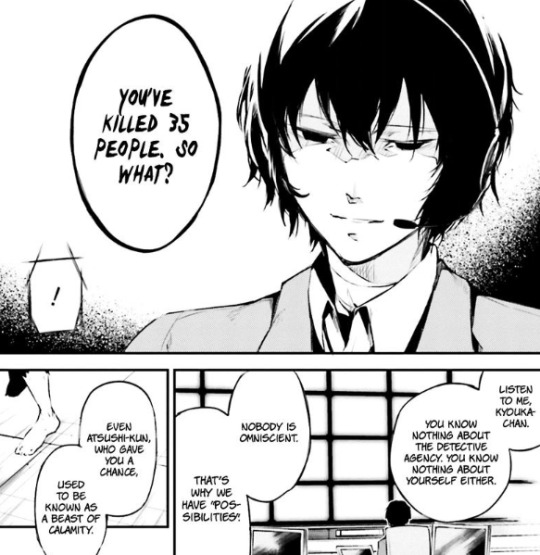
Opening your mind to the idea that people are both capable of good and evil depending on the circumstances, allows a person who has done bad things to be given the chance to do good things for the sake of others around them. Twice has done bad things in the name of the league, but it’s also Twice’s love and genuine compassion for others that has stabilized mentally a lot of the members of the league and allowed them to become better as people.

Someone capable of fighting to kill is also equally as capable of fighting to use that strength to protect. Basically, reality will always be at odds to ideals. Neither Hawks’ ideals nor Twice’s ideals allign with the reality that both of them exist in. Which is why there’s actually no need for them to fight each other.
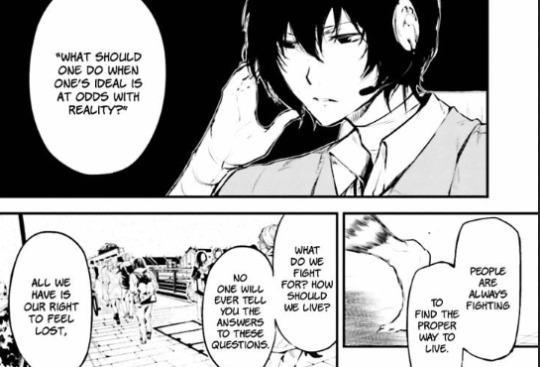

Empathy is the idea that everybody is struggling to live in their own way, that everybody is trying to live by their own means. Rather than forcing Hawks to Twice to fight, both of them could recognize that the other is struggling and needs help. Hawks needs someone to tell him that he deserves to be selfish, and take care of himself instead of continually sacrificing both himself and his emotions for the greater good. Twice needs someone to tell him that he doesn’t need to kill people, to be accepted by society. For both of them there are other options that exist, it’s just without empathy, without acknowledging the viewpoint of another person neither of them would ever be able to see those options.
What Hawks and Twice need isn’t for one of them to be right, and one of them to be wrong. They don’t need to fight and see who wins. What they need ultimately is each other to make up for what they are lacking individually. They are both victims with several things in common, while they’re capable of hurting each other because of what they have in common, they’re also equally capable of smypathizing with one another and helping to heal.

#hawks#takami keigo#twice#jin bubaigawara#my hero academia meta#league of villains meta#hawks meta#lov meta#philosophy#utilitarianism#deontology#collectivism#individualism#mha meta
413 notes
·
View notes
Text
The American Trilogy

People have said that Stanley Kubrick’s final 7 films are more like 1 film about humanity spanning different genres. It’s undeniable that there are specific parallels and connections between his films, but the way his films connect to each other on a basic level is quite interesting and not very difficult to see.
Dr. Strangelove ends with nuclear bombs destroying the world cut to the black void of 2001; The Dawn of Man. The end of the world caused by man’s violent nature transitioned into the beginning of man’s violent nature with Moonwatcher discovering the bone as a weapon.
2001 ends with the Starchild looking directly at the camera; at us, while A Clockwork Orange opens with a closeup on Alex’s eye. A transcended soul cut to a devilish man. The eye was a very potent symbol within 2001, representing the vast exploration possible inside oneself. The eye continues to be important in Clockwork, especially with Alex’s stigmata eyeball cuff links, strengthening the comparison to the godlike Starchild and Jesus Christ dying on the cross as a man, transcending to a God. Alex does not transcend, he lives on to do the deeds of evil men.
A Clockwork Orange, set in a near future or alternate reality, ends with an offer for Alex to move his way up the societal ladder by aligning himself with the same corrupt politicians who used the Ludavico technique on him in the first place, then a daydream with Alex surrounded by what look to be noble men and women of a past era observing him in a sexual act with a woman. The next film, Barry Lyndon is a period piece that explores the issues of class in 18th century Europe and trying to better oneself by moving up in the classist system. Clockwork is a story about where society is now (or was then), while Barry Lyndon explores where society was within the period piece genre. Interestingly enough not much has changed. Both world’s are violent, full of wealthy people using lower class people to further their own agendas, the people at the bottom forced to scratch their way to the top of a corrupt system, often using nefarious techniques to get ahead.
Kubrick is trying to communicate the way society / humans are and have always been while connecting the films with transitional elements that bring this idea into the viewer’s subconscious.
I believe those films, are also connected to the final three in Kubrick’s portrayal humanity and the way he sought to hold a mirror up to us via the cinema screen. However, The Shining, Full Metal Jacket, and Eyes Wide Shut seem to have a deeper connection to each other than the previous films. Yes, they too are an exploration of genre, using the conventions of it to subvert more complex themes, but I feel Kubrick started to develop ideas on how to thematically connect these films on an even deeper level throughout the 20 year period spent completing these three.
I suggest that the final three films act as a trilogy, exploring the genocide America was built on and the ideals of which continue to permeate through our society. These films are his ode to America’s dark secret hidden in plain sight. Not since Dr. Strangelove had he made a movie even based in America. These final 3 are inherently American films. While Strangelove was an overt criticism of authoritarian power, the final trilogy shrouds itself in a ghost story, a war epic, and a sexual thriller in order to issue Kubrick’s vicious critique.
Just to caveat, I don’t think the final trilogy are ONLY critiquing America but I do think this is crucial in all three films, more so than his others excluding Strangelove. 2001, Clockwork, and Barry Lyndon are more overtly commenting on humanity and culture in general.
Let’s get into how the final 3 specifically do this. I’m going to breeze by a lot of basic info that any Kubrick obsessive should already know.
The Shining references Native Americans constantly, the hotel is built on an “Indian burial ground” and had to repel Native American attacks while building the Overlook. There’s a ton of info on this out there already so I don’t feel it necessary to explain all the evidence to support this, but it’s overtly injected into the film, barely under the surface. There’s also a ton of material to support the idea that the hotel itself represents America and it’s constant ability to “Overlook” the horrors that our society is built on. Stuart Ullman, the Hotel Manager has an American flag on his desk, echoing his jacket and tie with an American eagle statue poking out form behind his head (Symbols related to characters’ heads are important in Kubrick’s work). In a film where mirrors are also important his initials backwards are US. The Shining is about the bloody birth of America and the generational inheritance of said violence. To see these things, one has to use their own ability to Shine and see through the veil of genre.
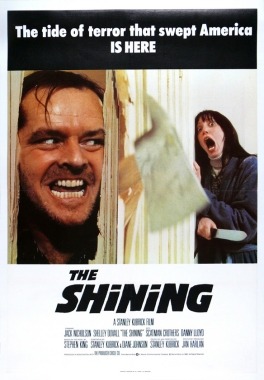
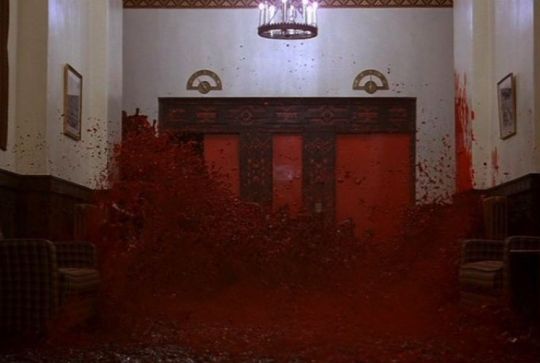
The next film is Full Metal Jacket, based in the Vietnam War. The film starts out with soldiers getting their heads shaved, representing the first step in their dehumanization at the hands of the U.S Military. Vietnam is not considered a just war and is an obvious extension of the genocidal characteristics America was born into. America is still doing the same thing that The Shining represents; going into a place full of brown skinned people and wreaking havoc for their own benefit and seemingly justified by racial bias. Vietnam is truly the beginning of a modern genocide, justified by politics, fear, money, and propaganda. This film came out in 1987, 12 years after Vietnam ended, but interestingly enough 3 years before another example of this American Imperialism; The Gulf War. Full Metal Jacket makes us look at something inhumane that just recently happened and yet most people remember the drill Sergeant yelling hilarious obscenities at the soldiers, many thinking the second half of the film as inferior to the first. As horrific as the dehumanization process of bootcamp is, it’s easier to watch than the reality that happened in Vietnam. In the film’s major battle sequence, we see multiple solders die, wasting hundreds of rounds only to find one young girl to be their target. This is the reality of Vietnam. Note the poster’s reference to Joker’s helmet, BORN TO KILL, relating to both the birth of America and the eagle behind Ullman’s head, turning him into a literal figurehead of this inherited American violence.
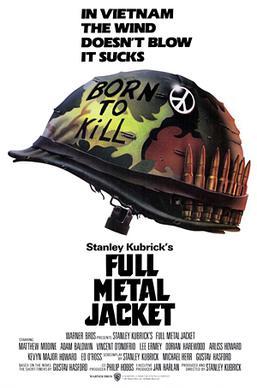
Eyes Wide Shut continues this theme from the perspective of someone living their adult life in post Vietnam society. The modern genocide has turned war into a commodity and has shown the darkest side of capitalism. Bill probably was too young to go to Vietnam but would be a first generation adult starting a family post Vietnam (meaning he was old enough to experience Vietnam as a child but not old enough to go).
Coincidentally enough, when EWS was released in 1999 the US were only a few years away from yet another unjust conflict in Iraq based on lies with huge non-compete contracts handed out to companies that the G.W. Bush administration had personal and financial connections with. It’s also interesting to note that although this couldn’t have been intended by Kubrick, the themes of generational violence being passed down through the generations connects to George Bush starting an Iraq war in the 90s while just over a decade later his son would do that same. Kubrick saw humanity in such a deep way, the good and bad, that he’s almost seen the future through his exploration of complex themes. Sadly though I don’t believe he was psychic, but purely able to to see the reality of cycles we humans perpetuate throughout time.
Eyes Wide Shut is about modern society’s classist structures and how someone like Bill Harford could be so oblivious to the dangers that surround his lovely life and how easily that can be taken away by his own inability to see himself and the various social constructs he participates in. He is blind to the world, happy as clam to live an upperclass Manhattanite lifestyle. This is inherently connected to the more overt violent themes in the previous two films. There is a cultural genocide perpetuated by the richest people who use others like pieces on a chessboard; built off of the original sin of America’s treatment of the Natives and continued through our unjust wars of today, finally providing the power structure for a few people to wield over the rest. Money in Eyes Wide Shut is equivalent to the axe in The Shining, the rifles in Full Metal Jacket. The first line in Eyes Wide Shut is, “Honey have you seen my wallet?”. This is no accident, it’s a seemingly insignificant line of dialog that immediately begins to beg you to pay attention to this theme.
- From The Shining: ULLMAN: We had four presidents who stayed here, lots of movie stars. WENDY: Royalty? ULLMAN: All the best people.
See my post on “All the best people”
18 notes
·
View notes
Text
Debunking Arthur Fleck Fluff HC’s
As a reply to questions I have received about Arthur’s ideal partner, his mental state, living with him, and much more, here’s a little background to the darkness in my tales and some thoughts on the matters.
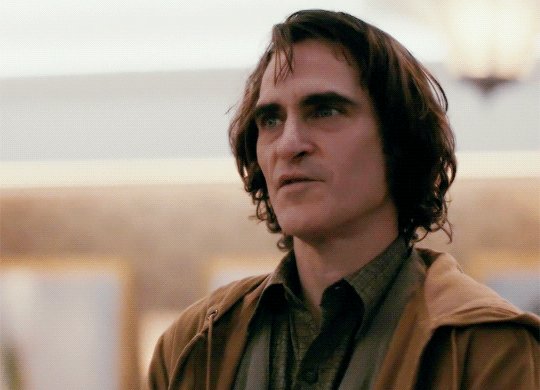
Oh, look, he’s so sweet. So romantic. Such a good boy. He would be such a great boyfriend, such a good partner, such a nice protective father. He just needs cuddles and lots of love.
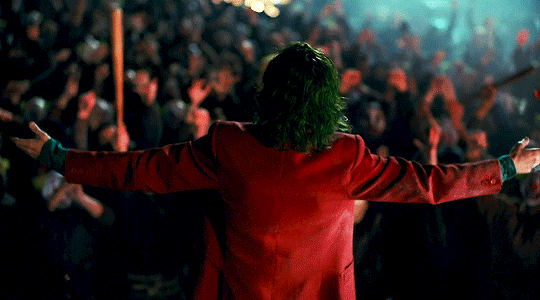
Welcome to my *essay*. Ever wondered why my depiction of Arthur Fleck is as gritty and dark as it is in some of my recent fics? Oh yes, I have written fluff and kind fics as well. But here are some reasons why I think that if Arthur Fleck were real, you’d better seek yourself a different guy to fall in love with.
Hold your horses:
1. Arthur Fleck’s mental health issue. 2. He is unpredictable. 3. He doesn’t see reality. 4. His humour is dangerous. 5. You would be emotionally and physically drained. 6. He murders people, including his own mother. What guarantee do you have he won’t kill you or your child? 7. And would you truly want a man like that to be the father of your children?
Warnings: This post contains sensitive content, such as topics of self-harm. Be aware of this and decide whether you wish to continue reading or click this away. This is purely explaining my own experiences and how they effect my view, explaining rather than convincing you how I got to this point of view I use in some of my darker fics.
My main points:
Let’s break it down.
1. Arthur has a real bad mental health issue, which is said to involve self-harm, negative thinking, hurting himself, hurting others, having delusions. Now why would that be a bad thing that you can’t overcome? - I’ve seen a large amount of Joker fans on Tumblr thinking that if they were there, they could help fix Arthur. And perhaps, they could. If they can, Arthur would not transform into Joker. But realistically, he would still need to take his medicine every day to keep his mindset as docile as it is at the start of the film. _ > Dangers: People who are on meds for their mental health have the tendency to, once they feel normal and happy, stop using their medicines and have a relapse. Which is very hard to see and you will have to use all your energy to help them back on track. _> A medicine can stop working. A mum of a friend of ours had this happen to her, where she became immune to her meds and had tried so many, some being taken off the market, others losing their effect after months or years of usage. She was tired of having to go through the whole process of finding a new one that worked. When it stopped being effective, she killed herself. _> A medicine can be taken off market. And whenever something happens to the meds, will your love be enough to keep Arthur standing tall? Because it might be bad luck, but the instances I have seen where people have had a serious case of reoccurring depression, or borderline syndrome, it always ended with the loved ones, despite giving it their all (their time, losing their jobs loving and taking care of them, their money, all of their possessions, their body and their soul, giving up friendships, other family members and what not), only to end up with it never being enough. That is to say, yes, there are many different mental conditions and each has different levels of severity. That is to say, every level can be severe, but while some give hope that the person suffering from it can function normally, or can find happiness, I think with all that the film has shown us, Arthur is at such a stage that we can assume it will not be cured miraculously. And you should wonder if anything you do could ever be enough.
2 & 3. He’s unpredictable.
This is part of his mental health issue. He has delusions as we noticed from the film. He doesn’t see reality. He imagines an entire relationship with his neighbour, who makes it quite clear she hardly knows the guy.
_> Danger: No matter what you do, you have no grip on the image he has of you in his mind. His reality differs from whatever it is you do. It will put you in immediate danger. -- Now why is this a terrible, terrible problem? Someone very close to me has mental issues and delusions. So I have first-hand experience. It is frightening! For years on end I have been careful about what to say, never to say something that will upset them, always say yes to whatever suggestion they give. Even if it ruins your own life. Even if they tell you all sorts of things that are wrong with you, or with people you love. You accept it out of fear because they are so instable and you want to help them forward. To give them the space they need, to look after them in times of need. And it is FRIGHTENING. Because this person I know changes personalities as well. In a way that we can argue Arthur changes personalities when he becomes Joker, but this person I know has over ten personalities and you never know who is coming out next. One personality is capable of doing normal grown-up things, the next is a small child, but all of them are angry, jealous and mean. -> Which is a big difference with Arthur. Let me make it clear now, I don’t think Arthur falls in this multiple personality disorder category. There’s a clear transition between him and Joker, possibly helped by the lack of medicine available and the effects of it waning. Arthur is unstable and unreliable because of what his own mind makes him perceive, not necessarily for being different personalities in one body.
To expand on my personal experience: This person imagines the weirdest and scariest things and to them, this is reality. Now this person is a very extreme case I won’t expand on, but they see things that didn’t happen. In a quiet room, they imagine a fight. People talking about the weatherforecast are in their mind plotting this persons death. Someone showing kindness is often in their mind someone doing something horrid or lewd and they can flip about it and shout, and throw stuff, and cause a whole scene.
So yes, no matter how kind you will be to Arthur Fleck, if his reality of you watching television is a contorted delusion of you telling him you want to walk out on him, and he places you inside his ‘bad people’ box, you might be up next for the chop. It’s how family drama���s occur, it’s one of the reasons why some people kill their loved ones because they don’t want them to get together with someone else, or live without them. Only, you don’t even have to actually want to walk away from him. He just needs to imagine it and your safety is gone. Another thing I like to think this person I know and Arthur might have in common is the obsessive and possessive way they would deal with partners. This person slowly made a web around their partner, isolating them from friends and family, making them even have to give up their job for them. They control their mobile, their email, stalk them online, send messages out of their partner’s name. Nothing that reaches the partner hasn’t run by this person, and this person takes their partner out of groups without telling them. They control everything of this persons live, and it grew so silently, so slowly, that the partner didn’t notice until it was too late. And now the partner doesn’t care. No one matters to them, no one except this person who they try with all their might to keep happy.. Which is incredibly sad. Because we can see the partner fading away, ill, unwell, with little to no joy left. And that is the bleak reality I have been faced with and still am faced with. And which I can’t ignore when looking at Arthur. The idea that he too could and would slowly create a web around the one who has taken his fancy, isolates them, makes them dependant and care only for his well-being. 4. A sign why he is dangerous. His jokes include murder, giving a glimpse of his brain. And though some might find his morbid humour funny, how would you feel if you were happily married, had a beautiful son you loved dearly, and someone would say “knock knock, your son is dead” and hold up the dead body of your son. Because think about it, his humour isn’t just humour. His humour is part of his fantasy, it is part of what he starts doing. It is a mirror of the darkness in his mind. And we have seen reasons why the murders he commit can be ‘justified’. But if you have to be realistic, can any murder be justified? A murder is still a murder, still bad. He still kills people. People we happen to know little about except that they took the piss off someone (or did they? read the note underneath this paragraph). But they have family members, friends, a mother and father. They have people who love them, who wait for them at home. How would you feel if your child, your brother or sister, your best friend, your lover, would not arrive home one day because someone thought they were bad because they ...let’s say... accidentally bumped against them in the street, or happened to look them in the eye, and were killed for it because the one they bumped against or looked at thought it was his right to do so. You would not laugh about it. You would be fucking livid.
- note: As the film is an account by Arthur, do we even know if the guys on the train actually abused him? What if they were just minding their own business and Arthur imagined being struck down by them? I mean, we do see bruises on his body, but it is his ambiguous account. Has anyone considered the possibility that the abuses took all place in Arthur’s head and he killed these men because of his own fantasy running wild and dark and morbid? I don’t think it went this way (I mean, there’s the textual evidence of Arthur having been abused in the past and what-not), but suppose for a moment that even that evidence is what came from his mind as he tells the tale, his reality. In a way we can’t trust anything that we’ve seen in the film..... 5. Ever lived with a borderliner? Then you will know how draining it is emotionally and physically. (Now, if you are diagnosed or consider yourself a borderliner don’t instantly take offence. I am talking about severe cases here, and as always there are gradations. And I do hope for you and everyone who loves you that your gradation isn’t as bad as the one I am about to describe. And if it feels it is, know you ARE LOVED.) Because if you know Borderliners you know this: They are usually the most glorious people you’ll ever meet. They shine bright, you can’t help but to instantly fall in love with them. And as such, I have never understood why they feel the need to be this self-destructive or why they never seem to understand how much they hurt all those around them who love them. But I’m not here to dwell on the hows and why’s and my own thoughts and experiences in this. I bring this up because people who are self-destructive, they suck the energy out of their loved ones. Or rather, if you love someone who wants to hurt themselves, it is emotionally draining. Because every time they want to hurt themselves, it feels like you failed, like you are not enough to them either. You can try to help them, keep them on track, and they can use your energy to keep standing. And with some people it works, with others unfortunately not as much. But now take Arthur Fleck who is an extreme case. He wants to hurt himself as well. You need to keep in mind that you will have to use every trick up your sleeve to stop him. Often. It can be little things as well. It can just be that he feels down and you have to tell him things to make him see the bright side again. But keep in mind, this won’t be once. This might be several times a day. It can be he has had a delusion that upsets him. You will have to put time and energy in to get him out of his dark mindset continuously. And if he’s anything like people I have experienced in the past, you might expect for him to bring extra drama when you’ve gone out and have a fun day, or part of a day, without him. Because he will be jealous, or feel left out, and he will probably have ruined the pans in the kitchen and burnt his own food and without words show you that you actually can’t leave. He might make hurtful or embarrassing comments when other people are around and his behaviour might scare of others, slowly isolating you from your friends. Until you are dependent on him, and constantly busy with him. And constantly trying to help him exist, and be sort of normal and sort of happy. Or in the worst case, you are constantly trying to keep all triggers away that will make him relapse and fall back into his dark thoughts. From experience, you’d think no one can handle that for long. But reality is that quite often, they persist, because they love the other THAT MUCH. Even if the one they love doesn’t understand, doesn’t seem to see, how much they sacrifice for them. But almost always they stick together till the end. And people can last for years like this. Years and years. It would count for you too. Once you’re in, you don’t want to get out because of your love for him. But you are constantly tired, you are isolated, you miss all the opportunities life offers you, you are always setting aside everything to make sure Arthur won’t flip. And even then, he flips. Constantly. But you don’t see how odd the live is that you stumbled into. After several years of slowly slipping into this life, you don’t see reality anymore. You don’t see what you miss. You are just surviving. And taking his hand to survive along.
That is what I have seen and still see. That is the basis on which I analyse a character like Arthur Fleck. That is why I can’t imagine you could have a truly happy ever after with him. 6. But worse than what I am witnessing in real-life, where the person I know who reminds me of Arthur’s mental quirks a lot is known for talking about murder, is the fact that we know Arthur Fleck is actually capable of it. And we also know that no matter what you do, if something in his brain makes the flip and he suddenly thinks bad of you, you might be up the chopping block next. This has nothing to do with whether or not he loves you. At this point we assume his love for you is real, it is strong, it is probably a lot like an obsession because once he has found you he doesn’t want to let you go again. And if he so much suspects you want to leave him, he might just make the choice that you won’t get away from him. Or if he thinks you have turned against him, what then? So consider this, are you truly save with this man? Because I don’t think you are. 7. Now, you have chosen to risk all above. You help Arthur take his meds and they work. He is sort of stable. He has his occasional sudden outbreaks where he is upset, tries to harm himself, laughs uncontrollably, and if he’s fine he makes morbid jokes. And you want a family with him because hormones and all of that stuff. Now imagine you are a child and you grow up in this small flat. Imagine it like this: You grow up. Now replace Arthur as your father with someone you don’t find physically attractive. Replace him with your own real life dad for instance. Imagine that you are born from your actual parents, but you live in a crappy small flat and your father wastes his money mostly on cigarettes (so the place stinks, but hey, if you can stand it kuddos). Imagine that your father has this laugh like Arthur, whenever he is upset. It comes out at random and sometimes unexpected times. And since you grew up with it, it frightens you, because it means your father is either sad or angry. And a kid’s initial reaction is they want their parents to be happy, so if a parent cries they cry along. It’s imbedded in children. Your father being upset upsets you too. He’s unpredictable and suffers from moodswings. One moment, he smiles at you and says he is proud of something you did, the next he is angry and shouting. Sometimes he snaps at you for something you didn’t do. A lot of the times he ignores you as he’s caught up in his own mind. When you are smaller, it is easier for him to be around you and he doesn’t show his ugly side as much, but when you grow older it gets worse. He is so familiar with you and your mom that he shows his bad side, his sadness, his irrational side, all of it, whenever he wants to. How will that make you feel? Scared? Uncertain? Not worthy perhaps, because of the way he snaps at you and blames you for things you didn’t do? Scared to say the wrong thing, to react in the wrong way. But as you grow up you discover that there is no right way to say things. When he is in one of his moods whatever you say is wrong, because a lot of the things are going on in his mind and he won’t or can’t share them with you. Sometimes you think he doesn’t like you because he’s distant, you can’t get him to respond to you and you might think he ignores you. He puts a lot of attention on himself with his unpredictable mood changes and the way he can be very dramatic about wanting to die, which can come out of nowhere and gives you the feeling you, as a kid, are not good enough. And it SUCKS. It sucks to feel that way. To be scared of your own parent all of the time. To be scared of what you say to him, what you do.
But the bright side, when you grow older you recognise parts of him in you. And if you can get through to him, he will recognise them too. And when you reach your twenties you’ll be able to talk. At first, it won’t be easy. But when it is, it is because you say you understand how he feels and you describe it to him so well, he believes you are pretty much a failure like him. He will say so in his own words. And you will accept it, but you won’t think you are a failure. Not anymore. Because you learnt how upsetting his behaviour can be, and you’re determined not to be that way. You show some of the symptoms, but not nearly as bad as him. And he reflects himself on you, thinks you are worse than you are, sees himself when he looks at you and takes it for a fact. Another of his delusions in which you play along because finally, finally, you two can connect.
You’d be so thrilled to leave the house and move to a place of your own.
Anyway.
TLDR;
- Accept the fact that you can’t change Arthur, which also means you can’t erase his negative thoughts.
- Would you be safe in this relationship? If you can’t control the reality he makes in his mind, and he actually starts murdering people, who can guarantee he won’t kill you next?
- Even if you don’t care dying by his hands, the relationship will probably be physically and emotionally draining for you.
- Still want to settle down? Do the test: Imagine your own father in Arthur’s role, behaving his way.
In conclusion: I don’t think anyone would live a happy live with Arthur Fleck. I think probably the most stable relationship, that will last the longest and have some semblance of a happy life, would be with a partner who is quiet, innocent, unexperienced, and who would sacrifice everything to keep him from tumbling into his dark mind. And he will tumble, even with all the best efforts. And it will still be a tiring, numbing and draining experience. But such relationships do exist in the real world, and unfortunately, I am still witnessing one that has been going on for years. And that’s why, I can’t see, from this distance, how anyone would be happy with the character of Arthur Fleck. He is too far gone. On the aspect of love: I feel I need to make it clear that love is, in all cases above, not a point of issue. Love will not diminish because someone has troubles of body or mind. For this, I imagined the love between Arthur and the other, both-sided. And no matter the hardships, I believe that once love is there it won’t falter. By the way he might ensnare you it might even feel as if it’s deepened, strengthened. And if you recognise yourself in some of the points I have mentioned above but struggle with yourself or your feelings, then know that no matter what ails you, there will always be someone who can love you, and health issues don’t equal the end of relationships. Not at all. From what I have seen, most partners stick by their loved one till the end. So don’t ever think that you could not find love for having a ‘fault’, or for simply being somehow different.
On my personal view of Arthur: He is still hot as f*ck though and I understand fully why people wanna tap that arse >) Arthur Fleck is a character that has not only his appearance going for him, but also all the mystery and complexity that make him interesting to write, read and fantasize about. Joaquin brought something alluring to the character, not just by the dubious glances and the paradoxical character he is playing (sweet and helpful caretaker versus revenge seeking murderclown), but the fraility of his character, both his emaciated body and his compassionately brought complicated emotions, are enough to lure anyone in. Because he makes us believe he is vulnerable. And he makes us want to get out there and hug him. While at the same time, all of us know that he can stand up for himself and that he is stronger than you would have given him credit for at the start of the film. And I believe, his character of Arthur Fleck / Joker would be stronger than most of us clown lovers. But that will not detain me. And I will continue to write about him doing smutty things and stuff, just because I can. And I will fantasize good things happening to him, and him being fluffy and ok as well, and write that down too. But in reality, we all know it probably wouldn’t be ok. Hence why I bestow you a few Dark Arthur Fics to balance against the pile of fluff I occassionally drown myself in. We can’t take just the good side of him, when there’s the complicated less prettier side to take into account as well. And perhaps, perhaps I can show us that we can love him for it just the same. We’ll see....
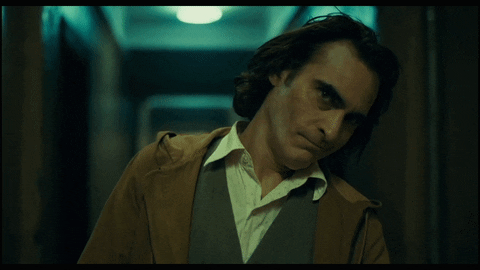
. . . .
And now I pose the question to you: We base a lot in life on assumptions. We are extra sensitive to the emotions of those we love the most. Keeping all this in mind, Can you truly be happy with Arthur Fleck?
58 notes
·
View notes
Photo
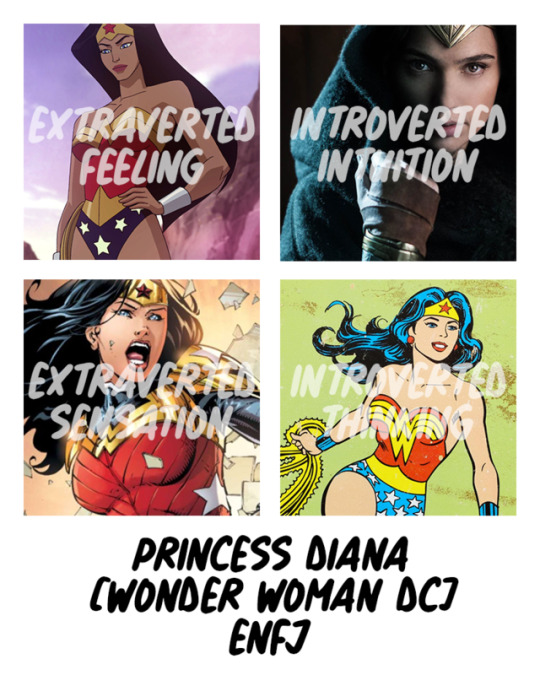
2018 Follower Favorite ENFJ Winner:
1. Dominant Extraverted Feeling [Fe]
If there is one thing that everyone can agree on about Princess Diana, is that she is focused on people. She cares deeply and always leads with diplomacy. Diana cares for people which is a clear F trait, but what makes her a dominant Fe user is her need to represent and protect all people and communities. She is invested in her role as Wonder Woman. She does this because she knows others need her. She understands that Wonder Woman represents ideals to others and strives to uphold the role.
Roles in society are very important to Fe dominants. Everyone must do their duty in their societal role. This is why we typically don’t see her try to leave her role as Wonder Woman in order to have a private life. She, unlike many other superheros doesn’t seem to need to have too much invested in a false identity. She is Wonder Woman in almost all facets of her life. Princess Diana and Wonder Woman are the same person. She isn’t putting on a costume to be Wonder Woman. Whether in her typical armor or in a leather jacket, she is the same person who takes on the same responsibilities. She rarely struggles with the idea of running away and having her own life like her fellow justice league co-workers. Her individual identity is intrinsically attached to being Wonder Woman and that role in the world.
We see how her Fe further manifests itself interacting with the rest of her functions.
2. Secondary Introverted iNtuition [Ni]
Diana is not necessarily a guardian of her people. This may seem odd as her shield and general role seems to be a guardian role. Which it is, but not the kind of guardian I am referring to here in the case of Ni vs Si use. The ESFJ often protects the hierarchy as is, not to say they cannot question it, but this is the typical role an ESFJ character plays. Diana uses her secondary introverted intuition to understand the cultures and ways of other peoples and individuals.
Diana strives for understanding of others, especially in an emotional sense. A great example of this is in Rebirth where we see her solve the conflict of the God of War with love and acceptance. She bestows this same love on Hades in New 52. Her lasso has sometimes become her Fe-Ni personified, as she discovers the true motivations of others. Her Ni gets directed back at her Fe when she is functioning properly; she uses the motivations she discovers to help others find their place within a community.
Wonder Woman is a great demonstration of Ni secondary synthesizing ideals. This brings us directly back to the guardian term I threw out. First I had to demonstrate the understanding, now we can get to how that effects the guardian role. Diana is not a guardian of the traditions and ways of purely her people. She pushes to unite all people. As she ventures into the world she wants to combine what it best for all people throughout her journeys. No matter the iteration, she does not hold one world above the other or as a direct threat to her way of life. She wants to find a way for all peoples to get along, to find what unites them. In this sense she is a guardian of all people, but not of her specific way of the life. This is the difference have how ESFJs and ENFJs protect people with their Fe.
3. Tertiary Extraverted Sensation [Se]
Now, this all sounds great and all, but how do we address Diana’s more violent tendencies? First, being an F type by no means naturally makes a character less likely to be violent. No function leads anyone to be more or less violent. Functions help us analyze how someone uses violence and gets to the point of violence.
Obviously, we get that Diana is a protector, but it gets confusing that a protector of truth and love doesn’t have reservations at times to kill those she deems bad or evil. Although she tries to resolve conflict with love, we also see a Diana who when talking with Batman gives him guff for not killing his enemies like she does. That way they don’t come back like Batman’s Joker. How does the INTJ Batman show mercy to criminals, while in this moment Wonder Woman, the ENFJ, does not?
This is what happens when Diana uses he Se to support her Fe rather than her Ni. In order to impose the justice and order she sees needs to happen, she can get headstrong and revert to an impulsive nature. She will be trapped in the moment and unlike dominant and secondary users of Se more comfortable with this mode of perception, she can quickly become the judge, jury, and executioner in a heartbeat. She feels justified with her Fe and reacts quickly with Se. As an ENFJ she can become impatient with systems in order to get what she sees as the ideal done. Part of this is being a Judging dominant type; reaching the ends is important and the ambiguity of it all can be tiresome. Her Se feels like it better supports her Fe in order to reach these goals sometimes.
Se is not always her enemy though. When she is using her Ni properly, we see Diana engage in her Se through how she de-stresses. She isn’t afraid to go out and enjoy the human way of life. Being in the moment as a “human” often liberates Diana from her life as Wonder Woman. She can let her hair down and have a good time with the rest of them.
4. Inferior Introverted Thinking [Ti]
Having an inferior thinking function does not make someone unable to use logic. Everyone’s judging functions has a logic to it.
For Diana, her inferior function means she can be uncomfortable with specifically situational logic. This means looking at the logic of exceptions to the rule. This runs opposite to her main judgment function of Fe. She doesn’t like the holes pointed out in how she tries to help all people. There are issues in universalizing all peoples and in how she wields her power in order to do so. She can be quite idealistic and in her sweeping philosophy, there are those and situations in which her idealism can be problematic, these moments are uncomfortable for her and hard for her to address.
#follower favorite#2018#ENFJ#winner#character portrait#mbti#wonder woman#DC comics#dc cinematic universe#princess diana#Fe#Ni#Ti#Se#functions
81 notes
·
View notes
Text
Forgetting to buy more SP patches before taking on the final boss was probably a mistake.
Forgetting to sell the items I can’t take into NG+ for cash that I can take into NG+ was probably a mistake.
Forgetting to get Arsene out of Lockdown so that I can record his awesome new stats for NG+ was probably a mistake.
In my defense, I was really excited. I wonder if the game will let me make a side trip while I’m out...buying flowers. Because that is what it has come to.
Buying flowers.
Shinya is a terrible brat and wasn’t in Akihabara at ALL until the day before the deadline. Thanks, Shinya. There goes my max confidants. Blugh. At least I got some other things done. Got the award for the maid cafe, so I don’t have to go back except once to open the Twins field trip. I still suck at batting even with third eye. But I am a champ at fishing, it only took me like five trips to the fishing pond to catch the Guardian! I could have done it in less if I’d figured out how to manage my bait properly sooner.
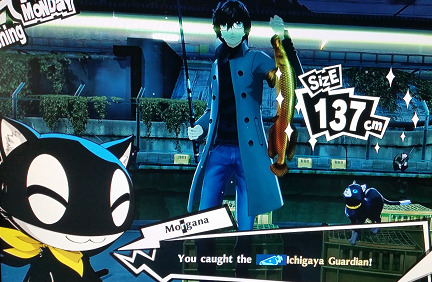
Smile, Akira, we’re awesome! ...still not even halfway to enough fish points for the award, though. :/
I am also awesome at the crane game in Akihabara, and by that I mean I am persistent and have enough yen that it doesn’t matter how many tries it takes.
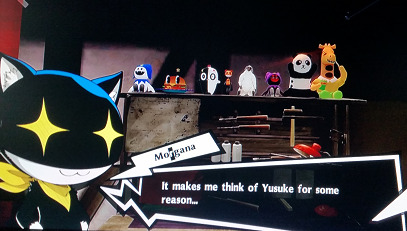
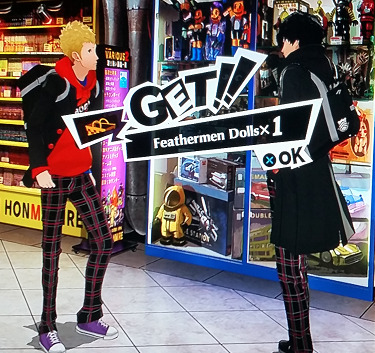
Ryuji truly knows the way to my heart. <3 I missed two episodes of Featherman; one I forgot to check the TV, and the other I was laughing so hard at the title that I forgot to write it down. But I know where they are, so it’s something else for NG+. ^_^
So I romanced Sumire, and I’m...slightly off-put. Only slightly. Not because of her, but once again, because of the writing. Sumire is cute, but the game is singling her out as “special” again.
She is the only one who confesses to you, and you explicitly have the option to turn her down, rather than the implications of a confession that you can shoot down indirectly (Haru’s, Makoto’s, Futaba’s), or the absolute fucking galaxy-brain leap of logic that is Ann’s dialogue choices. X’D
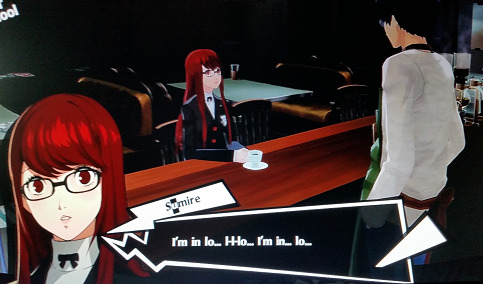
If you ignore that, though, they’re stupidly cute. Akira’s a little shit, as usual. Sumire asks you to “look at her”, based on her whole confidant thing of realizing that having someone you care about watching you makes you want to do better.
And so Akira looks.
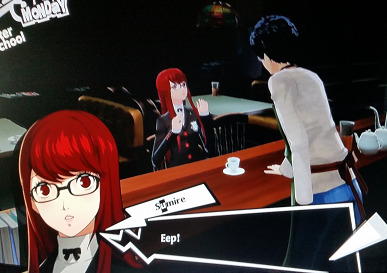
And looks closer.
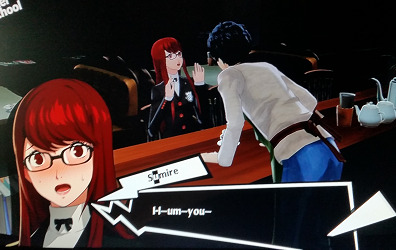
Dorks. XDDD
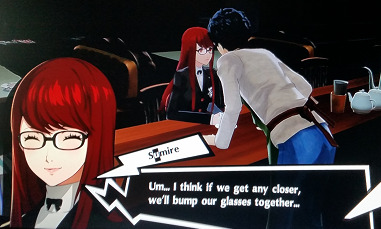
They’re sweet. Not my favorite romance route; that still goes to Haru. I think in the end I still prefer Akira adding another member to his army of younger siblings. He’s gotta be better than Yu. XDDD
So I got Kasumi’s rank 10 and literally the next day was February 2nd, and I spent the afternoon getting her third-tier persona. So I didn’t even get to see...Vanadis? in battle. Vanadis matches a little too well to Arsene for my tastes, and Ella is pretty, but I’m not sure how I feel about it looking kind of bride-ish when Maruki’s running around in a wedding tux.
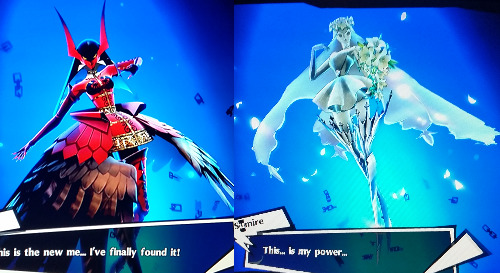
.
Anyway...what do we do the night before the meeting that will decide everything?
We make curry and we pretend everything isn’t about to go to hell.
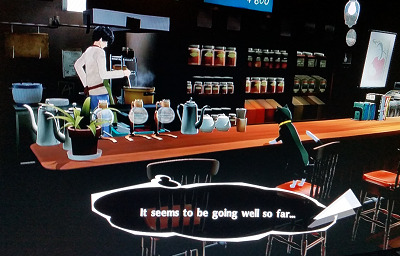
.
So, Maruki. Let’s chat.
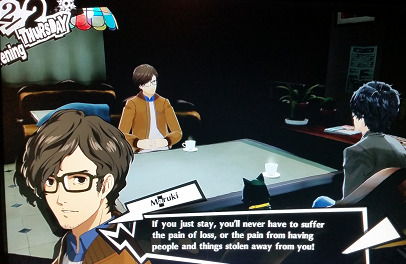
Does no one die in your world? Or move away? What if someone’s dream is to move abroad, and someone else’s dream is for that person to stay with them forever? If what we saw in your Palace is any indication, both of them would be tortured into accepting new dreams where they wouldn’t hurt each other. Dreams that you deemed acceptable. And that’s why you’re wrong.
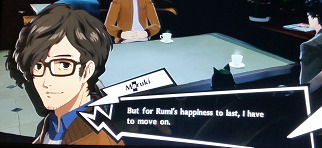
So you’re giving up your happiness to make sure everyone else is happy? Why can’t you just use your powers to make her remember you, without the trauma? Are you not all-powerful?
Or are you running away from the person that reminds you how helpless you used to be? You’re not moving on, you’re dwelling, and using it as an excuse to be terrible. For all of your kindness, you know Akira is a threat. And benevolent or not, you’re being manipulative. You’re using Goro against him. You’re hoping that he makes the decision you didn’t, and chooses the person he cares about over the reality he wants.
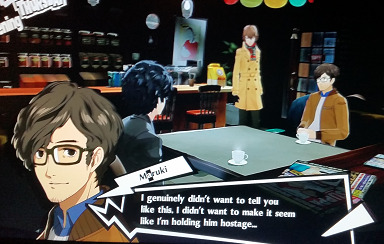
Every time he says something like this, I feel exactly the way he says he didn’t want me to. Newsflash, asshole, that’s exactly what it seems like. If we break your reality, you’re heavily implying he won’t be here afterwards. And you’re gambling that it will be too much pain for Akira to bear, because you know how important they are to each other.
Goro, meanwhile, is both perfectly determined and perfectly stupid.
“Don’t tell me you think dangling my life before us is going to have any impact on our decision.”
Goro. Honey. Do you really think he cares so little that he wouldn’t hesitate for just a moment?
Akira practically throws the calling card at Maruki before he leaves, which I think sums up his feelings pretty well.
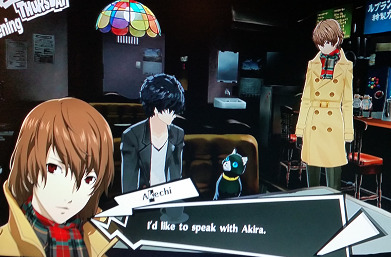
I appreciate that Morgana understands that this is something between them.
Goro doesn’t want to be controlled or manipulated ever again. Which... I get it. He’s never had a chance to have full control of his own life. But that doesn’t mean Akira isn’t going to be upset by the idea of him dying. Again.
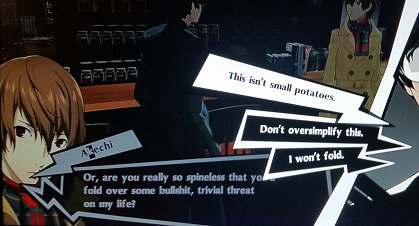
Two out of three dialogue options are basically “hang on one fucking second, your life matters to me.”
“Don’t oversimplify this.”
“Oh, but it IS simple. Do you think I’d be happy with this? Being shown mercy now of all times? I don’t want to be pitied-- this isn’t something I’m debating with you! Your indecisiveness is essentially a betrayal of my wishes.”
It’s not pity, you stubborn, idiot boy. ...and I hate that you see it as a betrayal.
Maruki is...very confident. And very kind. And part of the reason he upsets me is because he isn’t wrong, in many cases. But he uses that to justify imposing his will on everyone.
And being kind doesn’t mean that you are free from sin. You can be kind and still be manipulative. And selfish. In the end, that’s what separates him and Akira. Akira, despite all of his hesitation, refuses to be selfish. Even when he has every right to be. He will not hurt someone else to prevent himself from being hurt.
He will not hurt Goro by refusing to fight Maruki, even if it will rip his own heart to pieces.
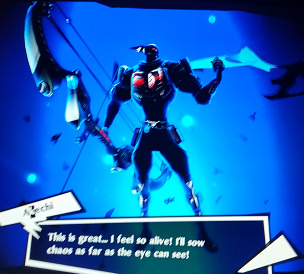
Oh, I like you. At first glance, the silhouette was very similar to one of Mordred’s original pieces of concept art, though, and I was ready to Yell before I looked closer. XD
And so, at 11:30pm, having completely forgotten the several things I needed to have done before the meeting with Maruki, we head in to steal the Treasure.
This man needs to stop. How dare he know how much I love Cool Stairs?
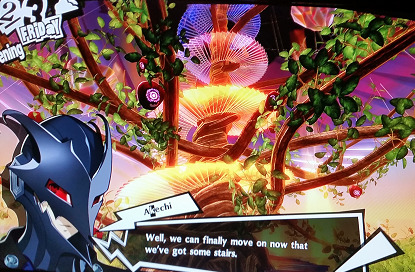
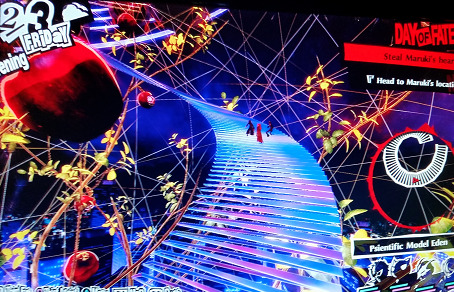
I find it very concerning that the core of Eden is a writhing mess of tentacles. The metaphorical worm in the apple? X’D We were so close to getting Nyarlathotep, but Azathoth is suitably intimidating. And I appreciate that he’s using the same concepts as the Thieves: his will to rebel against what he sees as an unfair reality, and removing his mask to summon his distorted persona. Thanks for validating all of my headcanon meta about Adachi and Palaces all in one go.
But...
I can’t do this. What the fuck are you wearing?
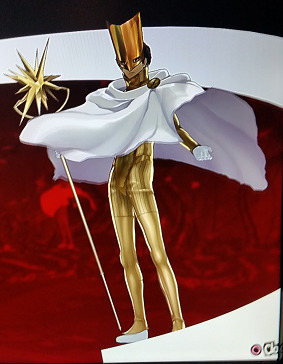

At least Azathoth is cool.
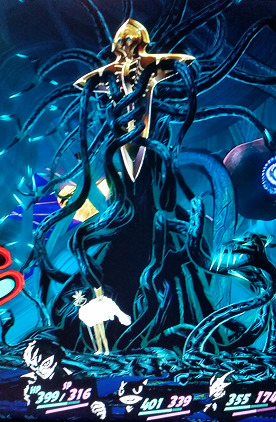
Somehow I managed to bring exactly the right team to get consistent four-person baton passes for the whole first round. That one was about half an hour.
...the second round was an hour and fifteen minutes because holy shit this thing was a tank and had entirely too many arms and really needed to stop healing.
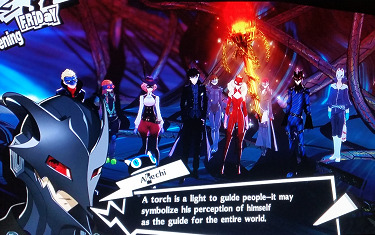
The torch is very pretty, at least.
And then before we can completely book it out of there, he steals the torch back and literally forces his second awakening so he can keep going. And at that point...what is he even hoping to accomplish? What is he going to do? Are you really willing to kill us to maintain this illusion?
The answer is apparently yes because it was a surprisingly poetic battle as each teammate in turn got a chance to fling themselves in the way and stop it from crushing Joker to death with it’s big giant hand.
And THEN he goes even further and validates some canon meta and me all at once by fusing with his own persona in a continuing last-ditch effort to... I really think he’s trying to kill us. I think he’s that far gone. Or at least his persona is. Because after the fusion, it’s specifically called “Adam Kadmon”, not Maruki. The persona is in control. It’s canon that if you try to summon something stronger than you, it can overtake and possess you. I know Maruki seemed to willingly give up control, but it’s also possible that forcing his second awakening like that left him with a persona that was entirely too strong for him.
(Nevermind that him being that strong in the first place is kind of ridiculous. That’s a discussion for after the final credits. I’m just hyped that someone fusing with their persona was a thing that actually happened!)
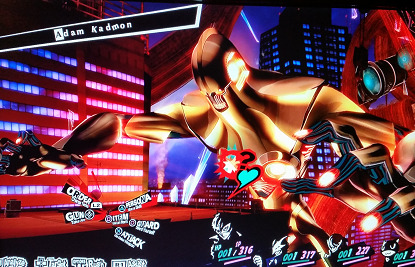
He’s so big. Where’s Satanael so I can fuse with him and we can have a megazord fight in Collapsing Ideal Tokyo? XD
The kids up the Holy Shit Quotient by a mile by catching the giant fist all together so that Joker can deal the final blow.
And what a final blow it is.
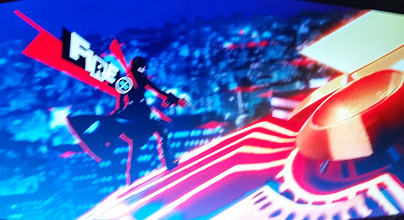
I really like this, because I don’t know if it was deliberate, but I read it as a callback to Daybreakers. Which came out before the game, iirc, so the first real piece of content. It’s just on a bigger, grander scale.
Everything comes full-circle in the end.
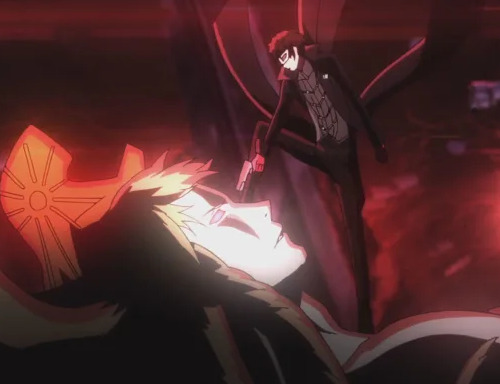
I really like the Mona helicopter. XD I just wish it was a little bigger, because poor Goro squished into the bottom. And poor Akira not managing to make it into the helicopter.
And this asshole WILL NOT STAY DOWN.
What is the point of punching it out on top of the collapsing Palace? Are you trying to kill us both? Do you just want to keep going until neither of us can stand? Dude.
And of course Akira won’t let him die. I think the upsetting thing about this, though, is really that you don’t get the chance to say a proper goodbye to Goro. Or anyone, really, but mostly Goro. The Palace crumbles, Akira wakes up in jail, the Thieves wake up the next morning after fighting all night, and Goro is...gone.
At least the Thieves seem properly sad this time. Even if it’s only for one scene.
Lavenza calls it “ironic” that “your wish for other’s happiness prevailed over your own.” I just call it unfair. Once again, hasn’t he done enough? At least he was only technically in jail for nine days from his perspective, but that must have been a whiplash of an adjustment.
Out of jail, Sojiro acknowledges he was Terrible at the beginning of the year, it’s 2:30am, time to do Valentines and then go to bed before the final walkaround.
And then Valentines passes. I spent it with Sumire. They’re cute.
And then it was February 15th and all the rest of the girls gave me chocolate?? It was just a constant ambush of being given chocolate all day?
And then it was March 3rd, and the Thieves are all splitting up and moving away? Are we sure this isn’t Scramble’s timeline? I get it, narratively, they’re taking the opportunities to move forward that Maruki’s reality would have denied them, but it still hurts.
And then it was March 13th and I still can’t save and now it’s 3am and apparently we get to play out White Day and Sojiro is giving me advice for the perfect date because captain idiot here forgot to plan anything and what heckin’ restaurant is getting this flustered that just mentioning Sojiro’s name is enough to get a table when they’re fully booked and---
Now it’s the 14th and I have to go buy flowers for my dinner date and I have finally been given control and saved and I am free.
Now next time I play I have to see if I can go sell my leftover items, because I’ve got a couple-hundred-thousand yen worth, and also rescue Arsene from prison. X’D
More thoughts on Maruki and everything after I see the ending, most likely.
#Li plays P5R#long post#the Longest Post#2.5 hour boss fight O_o#last time I spent that long on a boss it made me so mad I put the game in question down for six months
9 notes
·
View notes
Note
How old was jason when he died? And when he was resurrected?? And that time he spent dead make him crazier than Ra's when he is under the pit's effect?
The general consensus as far as I’m aware is that Jason was fifteen when he died, and he came back to Gotham in Under the Red Hood about five years later. There’s a couple different versions of the in between time, but most common I believe is that he was resurrected due to multiverse bullshit (like, the official explanation is that an evil teenage version of Clark Kent punched the dimensional walls of the place he was trapped outside of normal time/space so hard that the ripple effects of him breaking through like, caused ‘hiccups’ or anomalies across various universes - one of these being Jason’s resurrection. Yeah. I’m not making this up. LOL).
ANYWAY. The go-to version of the timeline I believe is that this happened about six months after Jason died, which was right around the time Tim started trying to convince Dick to come back and be Robin again and ultimately ended up becoming Robin himself. When Jason dug himself out of his grave, he was largely catatonic and unresponsive, and here’s where it tends to be most vague. After some period of time, which could have been anything from days to weeks to months, depending on who you ask, Talia was in Gotham for supervillain shenanigans or whatnot, came across him and realized who he was, and took him back to the League with her.
Where again it depends on who you ask, after some period of time, ultimately Talia convinced Ra’s to put Jason in the Pit to see if it would restore him to full consciousness and heal the remaining physical after-effects of his death. And also, her reasons for doing this tend to be subject to your own personal interpretation of Talia. Some view this as her doing it for Bruce’s sake, some view it as her just wanting to use Jason as her pawn against Bruce, etc.
Personally, I view it as somewhat in between, though again this is just my take. I ignore ‘Talia the rapist’ characterizations in both regards to her actions with Bruce and Jason, so I mean, I’m just not here for Morrison or Winick’s take on her in that regard. BUT I also kinda....highly object to the ‘soft’ characterizations of Talia that kind of make her the ideal parent that highlights how crappy Bruce is in comparison? Like, its no secret that I’m hugely critical of Bruce’s parenting, but I just....personally am not a fan of acting like Talia is amazing at it and noble and selfless either. I don’t like the outright vilification of Talia - especially when she ends up coming across as worse than Ra’s, which, no thank you - BUT I don’t like...blunting all her edges either, for lack of a better phrasing.
I tend to view her as someone who is extremely ambitious, ruthless and uncompromising in her own ways. I think a huge part of her dynamic with Bruce is that they mirror each other in so many ways, even if they’re not always on the same page. She’s often used as a narrative foil to Bruce, but I disagree - I think Selina and Bruce are the ‘opposites attract’ whereas Talia and Bruce are the ‘like calls to like/their bond in large part stems from how well they understand each other, even though they have different goals and aims most of the time’.
But point being, like......I don’t like shallow, two-dimensional interpretations of Talia where she’s just evil and has no shades of gray to her, but I also don’t like the flip side of that and her being viewed as the lesser of two evils compared to Bruce. Like, sorry not sorry, I think both of them need to take some parenting classes. Unless you drastically change Damian’s entire backstory and characterization by the time he arrives in Gotham, and/or insist that Damian’s upbringing was all entirely due to Ra’s control and Talia at no point in ten years had the option of arranging for her son to end up with Bruce or somewhere else where he didn’t spend his childhood being taught that affection was a sign of weakness and how to murder his nanny in six hundred different ways and show his work plz, like......I have trouble with the super!mom Talia takes.
All of which is just to say....I don’t believe Talia brought Jason back with her and put him in the Pit out of the goodness of her heart, but I don’t think it was entirely absent of positive intentions either? If that makes sense? I just mean...she’s a SUPER complicated woman in my take, and that’s what makes her so much more interesting than she’s usually reduced to being in a lot of stories. Talia is not as stone cold as she often comes across as a defense mechanism - I think she is someone who feels things deeply, but she shuts that down even harder than Bruce. She’s a very pragmatic individual, and I think she tends to justify a lot of even her most emotional-driven choices by finding an advantageous spin she can put forth as her ‘real reason’ for doing things.
So....I think her feelings for Bruce DID have a lot to do with her taking Jason with her. She does love Bruce in her own way, she always keeps an eye on him so she absolutely had to have been aware just how badly Jason’s death was affecting him, and so I think when she first saw Jason and realized who he was....I do think on a gut level, her motivations were like, she felt a need or want to take him with her and see that he was well cared for, for Bruce’s sake if nothing else.
BUT....I think the complication is she has trouble justifying that to herself, even, let alone to her father or subordinates or any of the others who constantly seek an edge over her within the League’s inner power structures and hierarchies. So I think that’s where the pragmatic side of her took over, and once she DID see to Jason at least nominally being taken care of....that’s when she started to look at it in terms of how she could play this to her advantage as well.....and whether that ultimately was in pursuit of convincing Bruce to join her side, and using Jason as leverage there, or just hurting Bruce for rejecting and hurting her and her chosen path, and using Jason to accomplish that.....tbh, like I said, I see Talia as an extremely complicated person and IMO the most likely take is that even SHE probably couldn’t say which she truly wanted or intended.....or perhaps it just changed at various points, and more than once.
My point with this tangent is I think there tends to be a very narrow focus on Jason’s return and Talia’s role in it as opposed to just the Pit in general. As much as Talia did help Jason, I think it doesn’t get acknowledged enough that as long as her own motivations and agenda were AT ANY LEVEL behind her choice not to reveal he was alive to Bruce....that’s something that I think could use more scrutiny in fandom, because that is a selfish choice, even if she did nominally spin it as being in Jason’s best interests. I just mean....it was a complicated situation, she’s a complicated person, you can’t add that up and still walk away with the simple narrative “Talia helped Jason after he came back to life and everything she did was to his benefit and in his best interests’ you know?
The thing is, the Pit’s influence aside, we have NO idea how things might have gone if Bruce, Dick and Alfred had ever gotten the CHANCE to get to Jason immediately after his submersion in the Pit and try and help him through it.....because Talia and Ra’s didn’t allow for them to ever have that chance. And that is a hugely critical plot point I think, that’s gone largely unexplored. There’s a lot of attention paid to how Jason felt upon learning that the Joker was alive, that there was a new Robin....but not a ton of attention paid to the HOW of Jason finding out all these things, and just how exactly this information was delivered to him and in what framing and context.
Because again, Pit influence aside....just sheerly in terms of the massive trauma and disorientation Jason had to have been going through upon having his full cognitive faculties restored by the Pit.....like....Jason came back to Gotham as an adult, ultimately. But at THAT stage of things....he was still likely only sixteen or so. VERY young. VERY traumatized. COMPLETELY isolated from all previous existing support networks.....and all of that adds up to being VERY. VERY. Impressionable.
And this is the part I wish got more focus. Just how much influence Talia, Ra’s and the League in general had over Jason’s thought processes, morality and ethics during that period he lived and trained with them....in the wake of a massive traumatic ordeal and with zero effort paid towards helping him cope and recover in any way other than what they laid out for him there. See, whatever Talia’s actual motivations for bringing him back and putting him in the Pit were....there’s not really any denying IMO that once that was done, she still took advantage of the opportunity Jason’s impressionability and gratitude for what she’d done (and just the interest and care she’d demonstrated in his eyes merely by doing it)....like, she still took advantage of the...influence this gave her over him.
Like.....Under the Red Hood? Eight heads in a duffle bag as Jason brutally slaughtered some of the key members of various crime organizations in Gotham and used that to gain the attention and fear and/or respect of various crime lords and organizations?
That didn’t come out of nowhere. And personally I think there’s too much focus paid to Jason’s potential for violence before his death, the murkiness surrounding Felipe Garzona’s death, and the effect the Pit still had on his mind when he returned to Gotham.......and not enough focus paid on WHERE AND WHO HE SPENT ALL HIS TIME WITH IN BETWEEN THESE THINGS.
Because as brutal as Jason could be at times as Robin......eight heads in a duffel bag is still a LONG way away from that. What its NOT a long way away from, however....is League of Assassins training, methodology and worldview.
Like, literally everything Jason did in Under the Red Hood came right smack out of the League’s playbook, so I’ve always just been like....forget the Pit for a second, guys! What about just....examining what effect being surrounded and trained by League assassins for three or four straight years in the wake of massive, life-altering trauma and circumstances that make you feel both INDEBTED to said League and BETRAYED BY all your previous loved ones who weren’t there for you....because they never had the opportunity TO be there, given that they weren’t the ones that ran into Jason while he was on the streets after digging himself up and like, even in the DC universe AT THAT TIME ‘hey wonder if he might end up resurrected somehow’ was not like, something that was at the forefront of anyone’s mind as a likely possibility?
LOL. Anyway. So that’s my hot take on Jason’s return.....yes, the Pit undoubtedly played a role, but I would love love love to see more of a role given just to looking at the sheer INFLUENCE the League and their teachings had over an isolated, traumatized and impressionable teenager.
As for the Pit itself.....that’s a topic for another day, probably, lol, but like...I have a LOT of thoughts about the Pit and how its used in various narratives, canon and otherwise. Because the thing is....its effects STARTED out as being brought into stories about Ra’s as kind of a moral fable. Like, essentially, the effects of the Pit in early stories were like....IMO more intended as a cautionary type narrative about the dangers of greed and being power-hungry, seeking to control even life and death, etc? I just mean like.....it originally came off as more of the idea “there’s no such thing as a free lunch” or in essence...everything has a price, and with something like immortality, the price is steep. There was a lot of focus initially on the idea that Ra’s was the man he’d become...only after centuries of using the Pit’s power to remain young, vital and alive. Power corrupts, essentially.
However, the problem I have...is that narrative becomes a wholly different thing when the Pit affects someone who DIDN’T seek to use its power, who wasn’t using it for selfish gain....nor like in Jason’s case...did they even have a choice about using it at all! This is the same issue I have with keeping Dick as a Talon in Court of Owls stories, and certain ways Cassandra’s story is told and her body language skills are used and discussed: I have a deep dissatisfaction with the idea of abuse inflicted by others, being like...the origin story or source of someone’s powers....when its paired at the same time with consequences that the person never asked for, would never have asked for......but the powers themselves tend to be the only thing focused on, rather than the drawbacks, with the overall takeaway ending up being that like.....the person should be grateful that the abuse happened in the first place because now they have these powers see, and isn’t that the most important thing?
So to correct myself, it isn’t quite the same thing, but I mean....the issue I have with Jason and the Pit here, in comparison, is that....Jason had no agency in choosing to go into the Pit. So to me.....its a big, BIG problem to have him ‘benefit’ from that in the form of look, he’s alive and well again, he has a second chance.....IF equal scrutiny isn’t being paid to the price he is stuck paying for the ‘gifts’ of the Pit, that second chance.....when he never asked to pay it in the first place.
And I don’t actually think I’m the only one who has that problem, I think most people just don’t spell it out to that degree....because what I mean there is......the Pit’s effects ever since Jason’s return like....aren’t viewed in the context of being a morality narrative anymore. At least not in regards to him. People rarely write the Pit as ‘corrupting’ Jason the way it was once suggested to have corrupted Ra’s, because like....Jason was a victim, not a person motivated by selfish desires for immortality. And people want him to be a hero (or at least an antihero) rather than the villain that DC has at times tried to make him instead....and I think even unconsciously, we’re all aware that it doesn’t really work to have a character like that ‘forced’ into a villainous role because of exposure to a mystical corrupting agent they never asked to be exposed to.
SO. The end result of THAT is that.....the way people write about the Pit has shifted, both in canon and fandom. And now the Pit’s effects are viewed less as a cautionary morality fable and more as like...a heightened form of PTSD, a metaphor for the extreme and beyond-imagining trauma of being brutally killed and brought back to life again.
And that is where things get murky for me again, because you end up with an unintentionally confused/skewed narrative where writers and readers often aren’t even sure themselves if they’re writing this mystical McGuffin as being an external force of corruption that makes people ‘worse versions of themselves’ OR whether its a PTSD/trauma metaphor that highlights the hurt/confusion/paranoia/intensity of tangled emotions that survivors of great traumas experience. And the problem there is, without actually intending to....I think you inevitably end up dipping into a lot of really problematic ableist ideas that reinforce some pretty negative impressions of mental illness, bad survivors and recovery in general.
Oops. Tangents happened again, huh. Oh well. Hope your answers are in there along with everything else I stuffed that response full of, lol!
14 notes
·
View notes
Text
Michael After Midnight: Heathers
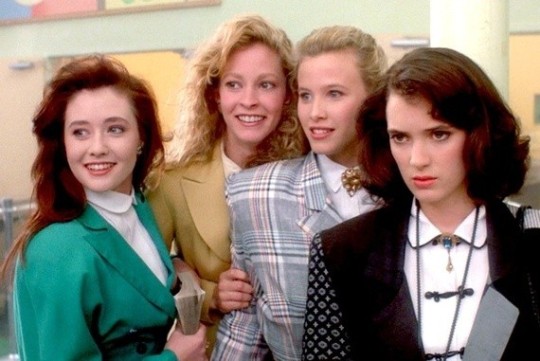
Heathers is a film that in some ways has not aged well, due to the plot involving bringing guns to school, murdering bully classmates, and an attempted terrorist attack on a high school by an angry, disaffected white boy. Back when this came out in the 80s, there was far less concern about things like school shootings, so this film could play these things up for black comedy rather than try to portray it seriously. But really, this is one of those rare occasions where it’s actually true to say “a film like this could never be made today!”
And it’s a real shame too, because beneath the pitch black comedy and dark subject matter there is a lot of solid, resonant messages and a plot that actually deconstructs the shallow view imitators and even some fans have of it.
I think perhaps the most important thing this movie did was show high school as it is: a miserable, shitty pile of cliques and unhappy teenagers struggling to make it through a single day without desperately wishing for their untimely demise. There is rampant bully, belittling, lies, slander, cruel pranks… this movie doesn’t waste any time sugarcoating things. And while yes, some things are played up for dark laughs, I can confirm myself that the cruel and miserable atmosphere of this film’s high school is barely off base from reality. I think just about the only thing lacking in realism is the fact that a guy like J.D. wasn’t called to the office on day one and grilled extensively by the principal, but hey, it was the 80s.
Another thing is how this movie deconstructs its core concept as the film goes on. Everything is set up as a movie where the miserable, bullied, browbeaten Veronica rises up with her handsome new boyfriend and strikes back at the nasty bullies in her high school, killing them off one by one. Fuck yeah! Revenge is awesome! Except… it isn’t. It’s shown that, as awful as these people they killed were, they still had families and friends who loved them, they had so many people who cared, and even if that wasn’t enough the way they set up their deaths as tragic suicides only goes to make them martyrs, rendering the vengeance hollow as in death all their sins in life are erased and ignored and people look far more fondly on them. Hell, by framing the jerk jocks as gay lovers killing themselves because they couldn’t openly be together, they managed to make a bunch of people in the late 80s be less homophobic! Need I remind you this was the decade in which the F-word was a pretty casual curse word instead of one of the absolute worst things you could possibly say? Their revenge was just that toothless.
And it all comes down to J.D. While he’s built up as this cool, rebellious figure bent on teaching society a lesson, as the film goes on it’s shown that even with all of his excuses, even with his shitty life, he’s still ultimately just a pathetic, angry, broken loner lashing out at the world around him without a care for who he hurts. Ultimately this is what helps drive Veronica away from him and reject his ideals. J.D. is a truly interesting villain; in many ways, he’s a prototype for Arthur Fleck from Joker, a broken man with a shitty home life who is driven to madness and murder because of the cruel, remorseless society he lives in; Christian Slater even seems to be doing his best Jack “The Joker” Nicholson impersonation in this film, even. And much like Fleck would decades later, J.D. shows that a shitty life never justifies atrocities, and for all the sympathy he can be afforded he definitely does cross the line, and the movie doesn’t really pretend otherwise.
This movie is filled with dark social satire of things like the sensationalizing of teen suicide, the awfulness of high school, the hollowness of revenge, and all of that, and yet it feels that far too many people take this movie at face value, viewing it as some sort of deranged power fantasy in which the bullies get what’s coming to them and their victims come out on top. I’m not sure where they get this idea because by the end of the film J.D. is dead, Veronica has survived but is fundamentally changed as a person, and all the people who bullied them are now forever remembered as tragic angels with their bad qualities brushed aside, because sometimes dead is better, as they say.
It’s interesting to note that the original ending of this movie would have been far darker than the ending we got, with the bomb going off and J.D.’s deranged worldview - “Let's face it, all right! The only place different social types can genuinely get along with each other is in heaven.” - being reaffirmed. I think that such an ending would have utterly ruined the film and made it a hard sell to anyone with a shred of decency. It would just be far too bleak and joyless, and not even in a fun way. It’s just depressing. The ending we got, where Veronica rejects J.D.’s insane bullshit and decides to live, is far more powerful and resonant.
This movie is such a brilliant deconstructive parody of 80s teen movies, shining a dark light on the less pleasant aspects of being a teenager while showing the futility of revenge, the baggage that comes with dating a quote-unquote bad boy, and sort of deranged mindset that would lead someone to think murdering their classmates could somehow make the world a better place… And yet so many fans take it at face value and just see at as “Wow! Cool revenge against the bullies story!” This movie is so much more than that, and to reduce it down into something s tacky, tasteless, and just plain not what it is at all is disturbing, to say the least. Let me put it this way: if Heathers actually was what some of its fans believe it is, I would probably agree that the movie shouldn’t exist.
But thankfully the movie isn’t that; it’s an absolutely brilliant dark comedy and an 80s classic. If you can stomach some truly dark and unpleasant subject matter and laugh at some really fucked up things, this is the movie for you, though I really hope you can use your critical thinking skills and not come out thinking J.D. had a point. It’s a fucked up movie about fucked up people showing the dark underbelly of high school and the society that produces that dark underbelly, and in that regard it excels. It’s the perfect cup of drain cleaner to wash down all those John Hughes movies.
35 notes
·
View notes
Text
Initially, I wrote an article for a Russian-speaking audience. I TRANSLATED WITH THE HELP OF AN ONLINE TRANSLATOR. WITHIN A FEW MONTHS I WILL TRANSLATE MYSELF, BUT MOST LIKELY TO THE GERMAN LANGUAGE.
Attention: I love the world of "Harry Potter," but I think the main character is antihero.
The system of roles that I have described for the story's characters is based on the Writer's Way (the old edition was called the Hero's Way), a classic Hollywood typology. Briefly about the typology Of " the way of the Writer/Hero's» The author believes that by giving a group of first-and second-plan characters clear roles that affect the plot and the Main Character, it is possible to create a strong story. Its typology was at first critically accepted, as proponents of chaotic plot creation thought that it would kill the individual. But in the end, everything turned out exactly the opposite and indeed the best pictures of American and European cinema were created using this typology. Proving once again that random writing can't create a clear and understandable story for female viewers.
------------------
In my opinion the path of the Writer/This is a very strong system, which has been present in the stories of Pixar, Disney, paramount, especially 20th century Fox and others for twenty years (or even more, it should be clarified). However, it creates at first glance clear restrictions that the authors first see and therefore decide to work within the framework, although the typology is intended to adapt to the authors, their mentality, mentality and territoriality (for example: the plot in Germany from an Irish immigrant will not be similar to the plot of an American, although they strictly followed the system of the role of heroes in the plot).
Let The Writer/The hero does not give full will in what characters to use and how. Since it has a total of 7 types (Hero, Trickster, guardian of the Threshold, Mentor, Werewolf, Partners and Shadow). Around which is usually built a dynamic, but short story, which is not easy for everyone to work through and yet is mostly suitable for a movie in the last 1.5 hours.
But it really can be useful, it's just better to Supplement it with your own interpretation and other typologies. It should be clarified that I will not touch on the manner of writing a story using the writer's Path system, since I do not share the opinion about its convenience. Although it is definitely more convenient than the classical system, which is actively taught in Russian universities, where thank you that there are not 25 steps in the story, which are told to put in 40 minutes of narration.
I used The Writer's Path/the hero to quickly think through what classic conflict/action should occur in connection with one of the characters.
Mentor. The mentor was the same Yoda from Star Wars. That is, the character performing the function of a Mentor should teach something to the Main Character/Hero, perhaps even accompany the story, like Merlin. Or teach a lesson and die provoking the Heroine / Hero into action (Uncle Ben from Spider-Man).
False Mentor. Negative Mentor, so to speak. He is trusted by the main character, he even teaches him, but leads thereby to destruction because he is actually an insidious manipulator. Dumbledore from Harry Potter.
The topic of Harry Potter as a character will be touched upon later to demonstrate how we can be manipulated by writers and writers who keep in mind the ideal image of the Main Character-Hercules.
The trickster. Tricksters are the most independent characters. People like to say that Loki from marvel is a Trickster, but in fact he only has trickster elements in his system of action. Namely, to act not only during the main actions on the screen, but also before, between, and behind them. Tricksters don't care about the goals of the Main Character, the Villain, or anyone else. They have their own goals and want to achieve them. Tricksters are always active and do not stand still, so they are rarely in the focus of the cameras or suddenly appear on the scene and thank you if they decide to support Hero. We can say that Tricksters are one of the most powerful characters, both mentally and physically, some of them therefore decide not to go into the main plot especially (if they are not interested in the reward for help or the object of the Main Character's hunt), because why should they go into what they decide with one hand? This is boring, and boredom is not for them, and they like to pretend to be physically weak. As a result, I will write that Tricksters exist so that the world in which the actions take place is alive. So that the tower over there will explode and attract attention, so that at this moment the reader will be hooked by its mystery trickster. To create an active and complete world atmosphere.
Guardian of the threshold. Always on the side of the villain. In the story, it serves to become the last obstacle for the hero, after which he is convinced of his strength and that he definitely needs to defeat the Shadow (the main villain). Sometimes it can take the side of the Hero, since the main role of the Guardian is educational and inspiring during the contact between them. The guardian can decide that the Hero is perfect or that his strength has earned his loyalty, and the Shadow will lose. Usually in the arches of the confrontation between Batman( the Hero) and the Joker (the Shadow), the role of the Guardian is performed by Harley Quinn, who is not rarely disappointed in the Shadow and tries to start living again. But most often the Threshold Guard is killed.
Werewolf. An inferior type in this typology. The author is still not completely sure how much it has the place to be, as a separate type, and not a special quality of other types. For example, a False mentor can also be called a Werewolf who seemed to be one, but turned out to be another. But a Werewolf takes place when the differences from the original image are so strong that it seems that it is a completely different character. That is, There was little red riding Hood - cute, but it turned out to be a serial killer who kills grandmothers and blames the wolf.
The shadow is always the main villain of the story. The shadow has similar features to the main character, not rarely the same weaknesses, desires, but unlike him, the Shadow does not restrain anything and it creates hell that. At the same time, because of similarities, they may have mutual understanding and dialogues, but because of differences, they can not coexist.
Partners-partners and there is nothing to describe here. Just the Hero's partners. All.
And now about the Hero/Heroine and what does the deception I mentioned earlier in the story about Harry Potter have to do with it?
A hero in the classical sense is all good deeds in one person and the desire to do everything for the best. This is a great image of a person who overcomes difficulties and solves the problems of the plot. Their personal plot is easy to understand and always equals the plot of the story.
However, there is also a plot about an anti-Hero. An antihero is a hero who tends to self-flagellate, do stupid things and negatively tune in to the world around him, trying on the mask of an often beaten person who can justify his negative outbursts, bad treatment of his Partners (including sitting on their necks). Antiheroes usually arise from an attempt to make the Trickster the main character, or to arouse pity from readers, often ending with the death of this antihero in order to teach the audience something.
And this is a description of the main character of "Harry Potter", that is, Harry himself. And classics stories about anti-Heroes he was also dragged through the plot, through his "do not want", while its true purpose (which is at least not entirely overlap with the purpose of his environment and history) a large part of the plot was not formed, and after the trigger 4 in the book, he started to want revenge for parents who didn't idealiziruete the image of his cause (revenge for ideal people and for the lost perfect life in complete comfort, instead of to create comfort; despite the fact that he also, like a typical anti-hero, clung to those who would give him this comfort). Then he learns information that tells him that perfect people are not completely perfect. And it is during this period that he begins to physically threaten other people, even committing actions that can kill someone, giving in to anger. Around the characters begin to die, which of course puts pressure on the antihero, but emotionally he does not often remember the deaths, quickly moving away (if it is not the characters who gave him either hope for comfort, or already giving comfort).
Like all anti-heroes, he also exhales sharply, then flares up, then sees that darkness is happening around him. Dies for the sake of achieving a good future (because the decision of the plot is always either in the death of the anti-hero, or because he can do nothing else). Sometimes the authors at the same time give the antihero during or after death a chance to solve the main conflict of the story plot with their own hands, organizing their rebirth, as if they are Phoenixes and are born again bright and clean.
Where do the legs of a typical anti-Hero story grow from? From Greek myths, where heroes often performed "feats" in which they not infrequently killed those who did not harm them or creatures that logically ate those who wandered into the heart of their territories, or killed deservedly villains, but again in the name of Victory, Revenge, to Order, and not justice.
Greek mythology as a whole can be characterized as an anti-Hero cult, which serves to satisfy and encourage the fact that at that time Greece was a very negative country in terms of moral appearance. However, these feats of HEROES were presented to all of us as something beautiful and truly heroic. The same disney cartoon about Hercules could not become anything else either. At the same time, thanks to the development of critical thinking people, it was noticed that the only one who had motivation - was Hades, and the same Zeus asshole.
And if you superimpose Hercules from the beginning of the story and Harry Potter, will there be a special difference in functionality? There are great forces and all around say that he is special, the world around him does not understand, he wants more and feels that somewhere there is a true comfort for him. He wants justice for Himself, not for others. Then something happens that gets him involved in the story's plot. He is given the opportunity to enter the magical world, where he seems to be in the theme, allowed to practice their own powers. At the same time, he does not want to return to the old world, as he is inclined to devalue all the good that he received there. He wants to become a Hero, feeling that he is an inferior classic Hero and something is wrong with him ( he is an anti-hero). And a sense of inferiority develops. There is a trigger that causes him to have a clearly formulated goal, but his goal is not perfect in fact. He is disappointed, but decides to act like a Hero, without showing empathy for others, emotionally distancing himself (he does not understand someone's reasons why they do this, but sees how they do it). There is a dangerous situation for their lives with the deaths of other people (or near deaths). The final, where he is white and cleared of doubt.
Very often, the Shadow of the anti-Hero in the final finally goes mad, reflecting the anti-Hero's obsession with his own goal. Remember when Hades and Voldemort had their roofs blown off?
This is the end of the article. Good luck to all and enjoy writing any texts.
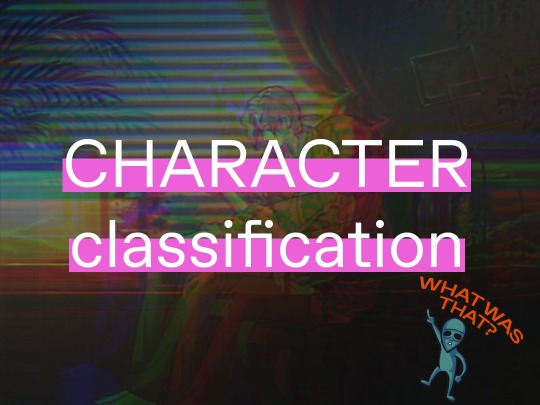
#character#characterdesign#blog#blog post#writing#The Writer's Way#Hero's Way#How to write#Harry Potter#Online translator#:d <3
2 notes
·
View notes